Acquisitions & Art Consultancy



APRIL 2016– MARCH 2017
Contemporary Art Society
59 Central Street, London EC1V 3AF
Tel: +44 (0)20 7017 8400
Email: info@contemporaryartsociety.org
Website: contemporaryartsociety.org
Follow us on social media
/thecontemporaryartsociety
contemporaryartsociety
@ContempArtSoc
Every effort has been made to contact all copyright holders. If proper acknowledgement has not been made, please contact the Contemporary Art Society. All rights reserved. No part of this publication may be reproduced, stored in a retrieval system or transmitted in any form or by any means, electrical, mechanical or otherwise, without first seeking the written permission of the copyright holders and of the Contemporary Art Society. Images cannot be reproduced without prior permission from the Contemporary Art Society.
Date of publication: May 2017
Edited by Franka Blok and Christine Takengny
Texts by Franka Blok, Caroline Douglas, Fabienne Nicholas and Christine Takengny
Designed by Hyperkit
Cover image: Ryan Mosley, An Oracle’s Vision, 2016, oil on canvas on board, 70 x 60 cm
Through the course of a politically turbulent year, paradoxically the Contemporary Art Society has enjoyed a period of stability and growth. We have ended the financial year 2016-17 in a strong position, with a total expenditure on art purchase that exceeds that of many preceding years.
We are very proud to report that we have been able to donate 42 works to 21 of our Member Museums. With an increasingly international perspective and a heightened conviction of the role that museums can play within communities, we continue to encourage the museum curators we work with to be as ambitious as possible in their collecting.
This year our already strong board has been joined by two dynamic new trustees: Emma Goltz, who now chairs the new Development Board, and Nicola Blake as Chair of our growing Young Patrons group. Both have already made a significant impact on our work, and become great friends of the Contemporary Art Society. Our group of Corporate Patrons has grown to include Hallett Independent, Sotheby’s and Gagosian, who join LGT Vestra, Mishcon de Reya, Momart and Frieze in supporting our core work with 70 museums across the whole of the UK. The year 2016 also saw us receive grants for core support from the Foyle Foundation and Garfield Weston Foundation, as well as a three-year grant from The Sackler Trust to support our professional development scheme for museum curators. Edmund de Waal is very generously offering three-year support for our Omega Fund to purchase craft.
Having launched our Artist’s Table fundraiser in 2015, in 2016–17 we held three further events. In September Linda Keyte chaired the committee for a wonderful evening with Haroon Mirza. In December Béatrice Lupton did the same for our biggest event yet in the studio of Antony Gormley, who produced five original drawings especially for the evening. In March, the final event of the year was masterminded by our much-loved patron Dasha Shenkman OBE, and held in the spectacular studio of sculptor Conrad Shawcross. All three events were as successful as they were enjoyable and made an important contribution to the financial stability we have achieved this year.
The acquisitions through our three Special Projects have been especially important this year. The first work acquired through the Great Works scheme is a painting by Glenn Brown for the Laing Art Gallery in Newcastle. This is the first painting by Brown to enter a museum collection in this country, and goes to the museum that the artist visited as a child growing up in the area. We are grateful to the Sfumato Foundation for supporting the Great Works scheme. Gagosian Grosvenor Hill hosted our celebration to mark this outstanding acquisition in November 2016. The painting will go on display in Newcastle in May 2017. Glenn Brown will curate an ambitious exhibition at the Laing in 2018, as part of the Great Exhibition of the North. The exhibition will include a group of his own works as well as his selection of works from the Laing’s collections.
Having entered into a partnership with Frieze London, the Collections Fund at Frieze made two important purchases at the fair in October. The Collections Fund Committee was very ably chaired by Cathy Wills, Anna Yang and Béatrice Lupton. We are grateful for the generosity of Béatrice and James Lupton who match-funded the contributions of the committee, making it possible to be far more ambitious. The committee chose to acquire for Middlesbrough Institute of Modern Art, whose socially engaged approach to working with their collections and communities has a particular resonance in the current climate. With the substantially increased funds available we were able to purchase works by Kader Attia and John Akomfrah, both of which will be on display in Middlesbrough during the course of 2017. These acquisitions build on the already distinguished record for the Collections Fund, which in recent years has purchased work by international stars such as Hito Steyerl, Ben Rivers and Simon Fujiwara. This year’s collaboration with Frieze London also gave the scheme far greater visibility, both at the fair and in the press.
Our third Special Project is the Valeria Napoleone XX Contemporary Art Society scheme, which in its first year has benefited tangibly from Valeria Napoleone’s knowledge of the US scene. The work purchased for Leeds Art Gallery is by LA-based rising star Martine Syms. Leeds Senior Curator Sarah Brown engaged in a period of research with Valeria through 2016, and will present the two-screen video work as part of the displays for the reopening of the gallery in October 2017 following an extensive renovation. In adding this work by a young, black female artist to the collections in Leeds, we bring the voice of a different generation with important new perspectives to share. Through our Acquisitions Scheme for fine art we have supported an acquisition of Mark Leckey’s film Dream English Kid, 1964-1999 AD (2015) for Tate this year. Two works have been acquired that were made especially for particular collections: Jessica Warboys has made a painting on the shore at Birling Gap that will enter the collections of the Towner Art Gallery, and Lothar Götz has created a new painting that relates to his recent exhibition at The Collection in Lincoln. In a year that has seen an emphasis on painting,
we were also very pleased to purchase a work by 2017 Turner Prize nominee. Lubaina Himid for Gallery Oldham, and a group of pastels by Chantal Joffe for the New Art Gallery, Walsall. For all the fine art acquisitions we have benefited from the guidance and support of members of the Advisory Committee: Steven Bode, Brian Griffiths, Daniel Herrmann and Jennifer Higgie.

Our craft advisors – Alison Britton, Sarah Griffin and Tanya Harrod – have also given invaluable time and expertise. We are proud to have supported the acquisition of a major work by Neil Brownsword for the Potteries Museum and Art Gallery in Stoke-on-Trent, for example, as well as a number of pieces of contemporary jewellery for Aberdeen Art Gallery.
There have been some notable Gifts in the past year, including an extraordinary, large-scale sculpture by Alison Wilding that was donated by law firm Simmons & Simmons, and two paintings donated by Ryan Mosley that will enter the collections of the Graves Art Gallery in the artist’s home town, Sheffield. The CAS Consultancy team has seen an unprecedented 30% increase in business in the past year. Highlights for the team include developing a new collection for the New York office of our long-time client Aspen, with a focus on new forms of abstraction and digital practice being explored by younger New York artists. A number of public art strategy contracts for major London landowners, such as the Crown Estate and Grosvenor Estate, attest to the increasing recognition for the work of the team in delivering large and complex projects. For the public sector there have been contracts for the GLA and DCMS that will come to fruition in 2017/18. The Consultancy team have benefited greatly from the experience and acumen of our trustee Sabri Challah.
The past financial year has seen public funding cuts impact even more deeply on our Museum Members. A few, such as the New Art Gallery Walsall and The Towner in Eastbourne, have made headlines, but many other institutions are struggling with the loss of specialist staff and programme funding without any publicity. In times such as these the work that the Contemporary Art Society does in supporting not only collections, but perhaps particularly the determined, innovative and expert people who curate them, is of greatest value. We would like to offer heartfelt thanks to all those individuals who contribute to our work –you really do make a difference.
Aberdeen Art Gallery & Museums (p.58, p.60)
Birmingham Museum and Art Gallery (p.26)
Bristol Museum & Art Gallery (p.28, p.64, p.66)
Brighton Museum & Art Gallery (p.62)
The Collection and Usher Gallery, Lincoln (p.30)
Gallery of Modern Art (GoMA), Glasgow Museums (p.32)
Gallery Oldham (p.34)
Graves Gallery, Museums Sheffield (p.36, p.76)
Laing Art Gallery, Newcastle-upon-Tyne (p.14)
Leeds Art Gallery (p.22, p.38, p.78)
Middlesbrough Institute of Modern Art (mima) (p.16, p.18, p.40, p.68)
The New Art Gallery Walsall (p.42)
The Pier Arts Centre (p.44)
Plymouth City Museum and Art Gallery (p.46)
The Potteries Museum & Art Gallery, Stoke-on-Trent (p.70 )
Scottish National Gallery of Modern Art, Edinburgh (p.48)
Tate (p.50)
Towner, Eastbourne (p.52)
Tullie House Museum and Art Gallery, Carlisle (p.54)
Williamson Art Gallery & Museum, Birkenhead (p.72)
LONDON
1 The British Museum
2 Government Art Collection
3 Guildhall Art Gallery
4 Imperial War Museum
5 Museum of London
6 National Maritime Museum
7 South London Gallery
8 Tate
SOUTH EAST
9 Brighton Museum & Art Gallery
10 Pallant House Gallery, Chichester
11 Towner, Eastbourne
SOUTH
12 Ashmolean Museum of Art and Archaeology, University of Oxford
13 Reading Museum
14 Southampton City Art Gallery
15 Swindon Museum and Art Gallery
SOUTH WEST
16 Bristol Museum & Art Gallery
17 Plymouth City Museum and Art Gallery
18 Royal Albert Memorial Museum & Art Gallery, Exeter
EAST OF ENGLAND
19 Norwich Castle Museum & Art Gallery
20 UH Galleries, University of Hertfordshire, Hatfield
WEST MIDLANDS
21 Birmingham Museum and Art Gallery
22 Herbert Art Gallery & Museum, Coventry
23 Leamington Spa Art Gallery & Museum
24 Mead Gallery, University of Warwick Art Collection
25 The New Art Gallery Walsall
26 The Potteries Museum & Art Gallery, Stoke-on-Trent
27 Wolverhampton Art Gallery
28 Worcester City Art Gallery & Museum
EAST MIDLANDS
29 New Walk Museum and Art Gallery, Leicester
30 Nottingham Castle Museum & Art Gallery
31 Rugby Art Gallery & Museum
32 The Collection and Usher Gallery, Lincoln
YORKSHIRE & THE HUMBER
33 Cartwright Hall Art Gallery, Bradford
NORTH WEST
47 Abbot Hall Art Gallery, Kendal
48 The Atkinson Gallery, Southport
49 Bury Art Museum
50 Gallery Oldham
51 Grundy Art Gallery, Blackpool
52 Harris Museum & Art Gallery, Preston
53 Manchester Art Gallery
54 Peter Scott Gallery, Lancaster University
55 Touchstones Rochdale
56 Tullie House Museum and Art Gallery, Carlisle
57 University of Salford Art Collection
58 Victoria Gallery & Museum, University of Liverpool
59 Walker Art Gallery, National Museums Liverpool
60 The Whitworth, The University of Manchester
61 Williamson Art Gallery & Museum, Birkenhead
SCOTLAND
62 Aberdeen Art Gallery & Museums
63 Gallery of Modern Art (GoMA), Glasgow Museums
64 The Hunterian, University of Glasgow
Leeds
65 The McManus: Dundee’s Art Gallery & Museum
41 York Art Gallery
NORTH EAST
42 Hatton Gallery, Newcastle University
43 Laing Art Gallery, Newcastle-upon-Tyne
44 Middlesbrough Institute of Modern Art (mima)
66 The Pier Arts Centre, Stromness
67 Scottish National Gallery of Modern Art, Edinburgh
WALES
68 Amgueddfa Cymru – National Museum Wales
69 Glynn Vivian Art Gallery, Swansea
NORTHERN IRELAND
70 Ulster Museum, National Museums Northern Ireland, Belfast
‘One of the strengths of the Great Works scheme is that it recognises that for many people the formative experience of art will be in regional collections and even in times of public funding challenges those collections deserve to be not only protected but enhanced. This acquisition is a major coup, raising the gallery’s profile nationally and internationally, and engendering a sense of pride in the quality of artistic talent from the region.’
Julie Milne, Chief Curator of Art Galleries, Tyne & Wear Archives & MuseumsGlenn Brown
In the end we all succumb to the pull of the molten core
2016
Indian ink and acrylic on panel 135 x 95 x 2.8 cm
While the Contemporary Art Society is principally known for buying artists early in their career, we are acutely aware that decades of funding pressures have left gaps in collections across the country. Future generations will find it inexplicable that through a period of unprecedented international acclaim for artists working in Britain, so many of our public collections have been unable to collect examples of their work. Once a year, through the Great Works scheme that has been established with the support of the Sfumato Foundation, the Contemporary Art Society will attempt to address this situation.
This year, a work by the internationally acclaimed artist Glenn Brown has been donated to the Laing Art Gallery in Newcastle-upon-Tyne. Brown was associated with the generation of artists known as the YBAs (Young British Artists), who came to prominence in the late 1980s, and showed with them in a number of exhibitions that came to define the period. Since that time Brown’s work has been shown and collected by some of the most prestigious institutions worldwide, and yet none had found their way into a museum collection in the UK. It is also thanks in large part to the great generosity of the artist that we are able to respond to the Laing Art Gallery’s desire to make this inaugural acquisition of a work by Brown.
In the end we all succumb to the pull of the molten core (2016) was made especially for the Laing in Newcastle, and is recognisable
as part of a new body of work that the artist has embarked on since 2014. Famous for his appropriation and manipulation of old master paintings, Brown has developed a new group of works that instead borrow their subject matter from Renaissance drawings. The grey ground of the painting references the coloured paper favoured by artists of the period, and his black ink and white acrylic mediums mimic the ink with chalk highlights that were typically employed in sketches and preparatory works.
In this instance Brown has combined drawings of the head of an old man by Giovanni Domenico Tiepolo and that of a young man by Andrea del Sarto. The faces emerge from a gaseous swirl of almost calligraphic lines, the heads melded together as the young man looks forward to the future and the bearded elder looks back to the past with occluded eyes. The accumulation of marks would suggest a plasticity to the surface, but as with his earlier paintings, the hermetic smoothness of the finish denies any probing of the picture plane. While Brown’s paintings are emphatically handmade, the conjuring of protean form from an inchoate swarm gestures to very contemporary forms of digital animation.
Glenn Brown (b. 1966, Hexham, Northumberland, UK) lives and works in London and Suffolk. He studied at the Norwich School of Art, Bath College of Higher Education, and Goldsmiths College, University of London. His work has been the subject of numerous solo exhibitions including Rembrandthuis, Amsterdam (2017); Fondation Vincent van Gogh, Arles (2016); Frans Hals Museum, Haarlem (2013-14); and Tate Liverpool, Liverpool (2009). His work has also been part of various group exhibitions, including Centre Georges Pompidou, Paris (2013); Kunsthalle Vienna, Vienna (2011); and the Venice Biennale (2003).
Presented by the Contemporary Art Society and the artist through Great Works, supported by the Sfumato Foundation, 2016
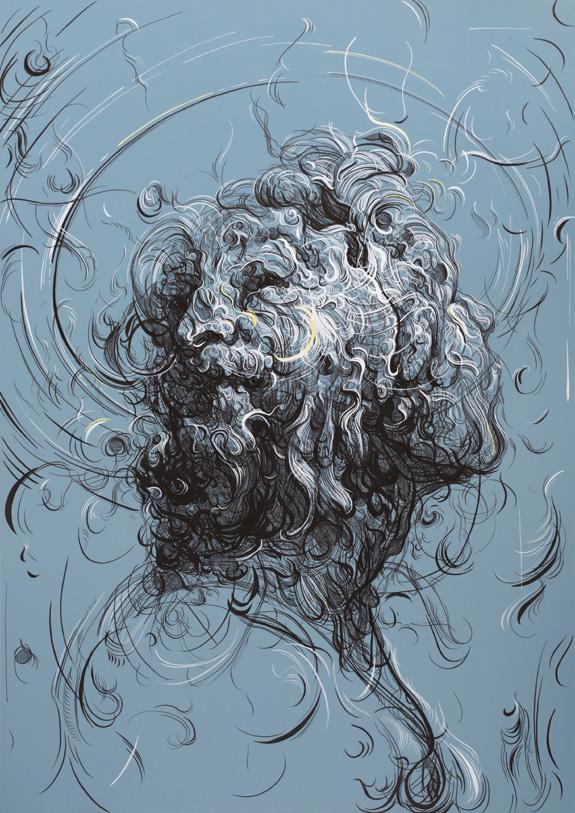
The Contemporary Art Society’s Collections Fund was set up in 2012 and this year has worked in partnership with Frieze London. This scheme supports the acquisition of significant contemporary works for Contemporary Art Society Museum Members across the UK. It aims to draw together the knowledge, experience and expertise of private collectors with that of museum curators.
Through the Collections Fund at Frieze, the Contemporary Art Society has acquired two moving image works by John Akomfrah and Kader Attia for Middlesbrough Institute of Modern Art. The works, purchased at Frieze London 2016, address themes of colonisation and migration, two of the most pressing issues of recent history and present times.
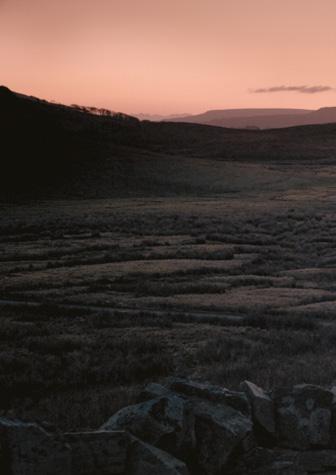
Middlesbrough Institute of Modern Art sees itself as a ‘useful’ museum, an institution with a social function that repurposes art as a tool for change. It seeks to play a civic role through a focus on education and community building, and these topics resonate with the diverse users and constituent groups it serves, which include the highest number of asylum seekers in the country per head of population.
John Akomfrah Peripeteia2012
HD single-channel colour video, 5.1 sound 17 min 28 sec
Edition 2 of 5 (+ 2 APs)
John Akomfrah was a key figure in the British Black Arts Movement active in the 1980s. While studying at Portsmouth Polytechnic, Akomfrah co-founded the Black Audio Film Collective in 1982 in collaboration with fellow students. Together they produced experimental films that explored black identity and political issues such as the racial tensions that led to riots in the UK during the early- and mid-1980s.
After the Black Audio Film Collective dissolved in 1998, Akomfrah co-founded Smoking Dog Films. Examining race, identity, cultural memory and the experience of diaspora through a lyrical aesthetic narrative, his recent films are at once politically engaged and poetic.
Inspired by the depictions of a black man and woman drawn by Albrecht Dürer in the early sixteenth century, Peripeteia (2012) traces the appearance and disappearance of African lives in early modern Europe. In the film, two solitary figures move through a rugged Northern European landscape, before eventually reaching each other. These shots are punctuated with historic photographs of African people in traditional dress and sections of the painting The Garden of Earthly Delights (ca. 1500) by Hieronymus Bosch (1450-1516), which includes black figures. In reimagining the ‘lost’ biographies of the

individuals in Dürer’s portraits, Akomfrah explores memory, loss, and displacement.
John Akomfrah (b. 1957, Accra, Ghana) is a British artist of Ghanaian descent. He has had numerous solo exhibitions, including The Whitworth, Manchester (2017); Turner Contemporary, Margate (2016); Nikolaj Kunsthal, Copenhagen (2016); and Tate Britain, London (2013-14). His participation in group shows has included The Place is Here, Nottingham Contemporary (2017); All the World’s Futures, 56th Venice Biennale (2015); and History is Now: 7 Artists Take On Britain, Hayward Gallery, London (2015). In 2017 Akomfrah won the 7th Artes Mundi Prize in Cardiff.
Presented by the Contemporary Art Society through the Collections Fund at Frieze, 2016/17
2013
Double slide, single slide, and video projection, colour, sound Slide duration 13 min, video duration 36 min 35 sec
Edition 2 of 3 (+ 2 APs)
Dimensions variable
Kader Attia’s practice explores the legacy of colonialism on Western and Non-Western cultures. During his childhood, the artist spent time with relatives in Algiers as well as in the Paris suburbs. Growing up between two countries – a former colonising power and a colony – was key in shaping his identity.
Inspired by the anarchist philosopher Pierre-Joseph Proudhon and the anti-colonial thinking of Frantz Fanon, Attia is concerned with strategies of ‘reappropriation’ through which Non-Western cultures can be reclaimed from colonisation. By first acknowledging the ‘dispossession’ that occurs when the influence of the Non-Western world on Western society is disregarded, Attia believes that ‘repair’ can then be achieved through cultural exchange.
Dispossession (2013) is an installation that examines the role of Christian missionaries in the colonisation of African cultures. The Vatican has a collection of over 80,000 rarely shown African artefacts, brought back to Europe by missionaries during the colonial era. These objects are presented as slides alongside a video series of four interviews conducted between Attia, an anthropologist, an art historian, a priest and a lawyer. The subject of repatriation is central to the installation as it considers the political and psychoanalytical questions that arise from the collecting of these objects.
Kader Attia (b. 1970, Dugny, France) is a French artist of Algerian descent. He has had various solo exhibitions, including at the Museum für Moderne Kunst, Frankfurt-am-Main (2016); Musée Cantonal des Beaux-Arts, Lausanne (2015); Kunst
Werke, Berlin (2013); Musée d’Art Moderne de la Ville de Paris (2012); Institute of Contemporary Art, Boston, MA (2007). His participation in group shows has included Foreign Gods: Fascination Africa and Oceania, Leopold Museum, Vienna (2016); But a Storm Is Blowing from Paradise: Contemporary Art of the Middle East and

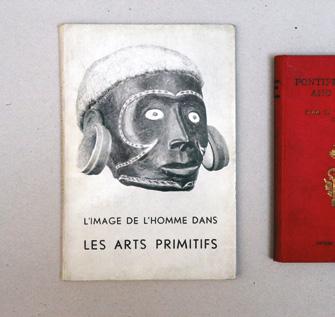
North Africa, Solomon R. Guggenheim Museum, New York (2016); Picasso in Contemporary Art, Deichtorhallen, Hamburg (2015); The Divine Comedy: Heaven, Purgatory, and Hell Revisited, National Museum of African Art, Washington DC. In 2016 he was the winner of the Marcel Duchamp Prize, Paris.
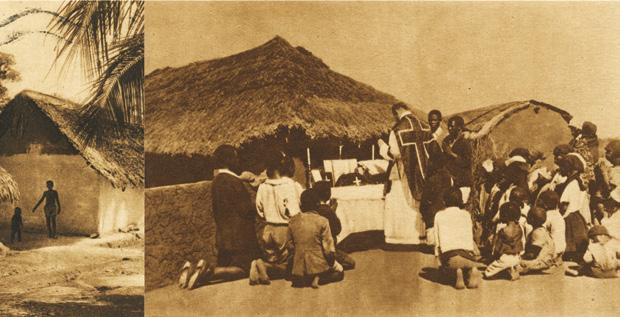
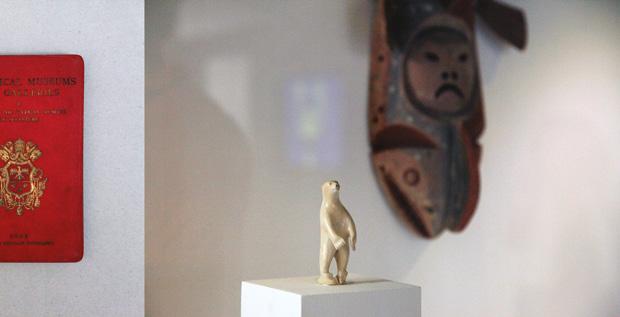
‘The Contemporary Art Society is a community of kindred spirits working towards a common aim of introducing contemporary artists and their work to people across the country, while enjoying gallery visits, talks and tours in the UK or abroad. I derive great pride and pleasure from being involved in providing access, possibly educating, and certainly being educated in this endeavour.
Being engaged in the Frieze Collections Fund Committee has been the most enriching aspect of my involvement with the Contemporary Art Society. The complete cooperation with museum curators and directors in identifying an artist and a work which will best integrate into the existing collection is hugely gratifying. The process itself is professional and utterly collaborative and the committee is proud of its achievement and impact.’
Béatrice Lupton, Contemporary Art Society Trustee‘I am particularly proud of this first VNXX CAS and hope that it will provide an entry point to contemporary art for an audience not familiar with it. We wanted this first donation to address the issues of today and relate to the demographics of the community that Leeds Art Gallery serves. As with all the XX initiatives the decision focused on maximising its impact and Leeds Art Gallery will particularly benefit due to its strong connection to a number of academic institutions in the region and its sound interest in working towards gender balance in both the collection and programme.’
Valeria NapoleoneA Pilot For A Show About Nowhere
2015
Two-channel video, colour, sound 24 min 29 min
Edition 5 of 5 (+ 1 AP)
A major work by LA-based artist Martine Syms has been gifted to Leeds Art Gallery through the Valeria Napoleone XX Contemporary Art Society (VNXX CAS) initiative. This scheme encourages debate on the gender imbalance in museum collections by donating work of a living female artist to a UK museum each year.
Syms works in publishing, performance, video, essay and photography. The artist often juxtaposes her own voice or appearance with found footage from the Internet, film and TV – particularly sitcoms – to probe linguistic and visual representation of gender and African-Americans in the mass media.
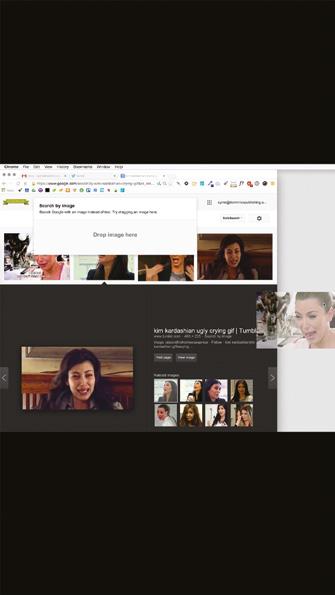
The video A Pilot for a Show About Nowhere (2015) was originally commissioned by the New Museum in New York. It gives a pastiched history of the depictions of African Americans in television, incorporating footage from a number of sources, such as The Cosby Show. Black sitcoms in the United States hold the potential to break down widely held preconceptions. At the same time, they often erase the struggles and realities of the people they represent. The work is a pilot for an imagined sitcom by Syms called She Mad, and re-enactments of the artist’s life ground the film in her own biography. Her appropriation of footage from American sitcoms, combined with a sophisticated take on twenty-firstcentury social media communication gives her a very distinct voice hat has not yet been seen in museums in the UK.
The video will form a centrepiece of a major collections redisplay at Leeds Gallery in autumn 2017, which will encourage new audiences to visit and explore the permanent exhibitons in the museum’s renovated spaces. It will also form an entry point to contemporary art for an audience not familiar with it as it strongly relates to the demographics of the communities that Leeds Art Gallery serves. Leeds Art Gallery will particularly benefit due to its strong connection to a
number of academic institutions in the region and its sound interest in working towards gender balance in both the collection and programme, for which this significant work will push further discussion.
Martine Syms (b. 1988, Los Angeles, USA) studied at the School of the Art Institute of Chicago. A Pilot for a Show About Nowhere was showcased at Camden Arts Centre, London in spring 2017, prior to going to Leeds Art Gallery. Recent solo exhibitions include
MoMA, New York (May 2017) and ICA, London (2016). She has also participated in group exhibitions at Raven Row, London (2017); Pinchuk Art Centre, Kyiv (2017); Institute of Contemporary Art, Boston, MA (2017); and Hammer Museum, Los Angeles (2016).
Presented by the Contemporary Art Society through Valeria Napoleone XX Contemporary Art Society (VN XX CAS), 2016/17

‘At a time when museums throughout the country are being stretched to their limits, the Contemporary Art Society’s role in acquisitions for public collections is more necessary than ever. We want our museums to be vibrant, evolving institutions that reflect what’s going on now, as well as then.
My series Shot at Dawn was made to mark the lives of men who our government regarded as best forgotten. For me it’s important that the echo of these executions can still be heard a hundred years later. Thanks to the Contemporary Art Society acquiring the work for Graves Gallery: Museums Sheffield, the work will be seen by new audiences around the country for many years to come.’
Chloe Dewe Mathews, ArtistPainting
2013-2016
Collages on paper, 8 parts
Each part 53 x 42 cm, overall size 53 x 450 cm
By appropriating classic film stills, vintage photographs, old travel postcards and book illustrations, John Stezaker makes mesmerising collages of a surrealist-like quality that depict invented personalities, landscapes and scenes. With immaculate precision, Stezaker fuses fragments of different pictures through slicing, overlaying and conjoining, thereby giving found images a new meaning while exploring or revealing their subversive quality. Painting (2013-2016), a sequence of eight collages, was completed during Stezaker’s curation of the exhibition Turning to See: From Van Dyck to Lucian Freud, which explored ideas of turning and metamorphosis in portraiture (Birmingham Museum and Art Gallery, 2016). It responds to a key series of work in Birmingham’s collection: Pygmalion and the Image (1875-78) by Edward Burne-Jones (1833-1898). Stezaker describes Painting as a contemporary allegorical reading of this major story from Greek mythology in which Pygmalion falls in love with his own carved sculpture of a woman, Galatea, who is brought to life by the Greek goddess Aphrodite.
The ambiguous collages in Painting predominantly consist of a succession of rhomboid holes through which pairs of film stills are intercut. The images come from a small collection of film stills featuring fictional artists, collected by Stezaker over a number of years. The intercutting encourages the viewer to see the film stills, now appearing translucent or mirror-like, in a different light. There are two key moments of connection between Stezaker’s collage sequence and Burne-Jones’s series: the female figure as both muse and painter, and the sexual
reversal of the male lighting the cigarette and sparking the muse. Stezaker equates the lighting of the cigarette to the sparking or triggering of the muse in the Pygmalion series.
Prior to the acquisition of Painting for Birmingham Museum & Art Gallery, Stezaker’s widely known collages were not yet represented in a collection in the West Midlands, the region of his birth. Therefore, the acquisition supports Birmingham Museum Trust’s aim to increase the representation of artists with a close association to the region and city. It is also in line with Birmingham’s policy to actively collect high-quality works on paper to further develop their strong holdings in this area.
John Stezaker (b. 1949, Worcester, UK) studied at the Slade School of Fine Art, London, and until 2006 taught Critical and Historical Studies at the Royal College of Art, London. Solo exhibitions include Whitworth Art Gallery, The University of Manchester (2017); The Netherlands Fotomuseum, Rotterdam (2015); Tel Aviv Museum of Art, Israel (2013); and Whitechapel Gallery, London (2011).
Purchased by the City of Birmingham Museums and Art Gallery Development Trust and the Tessa Sidey bequest fund with the support of the Contemporary Art Society, 2016 /17


Horizon
2009
Digital collage from online sources
Dimensions variable
Edition 2 of 5 (+ 2 APs)
Through video, sound and installation
Thomson & Craighead comment on the socio-political structures and developments of our Digital Age. They examine how systems of global communication, such as the Internet, impact and change our perception of time and space; concepts that are central to their work. With the appropriation of data, texts and images from online sources, they create works that re-contextualise the familiar, stimulating the viewer to see known structures and situations from a different perspective.
Thomson & Craighead tend to approach time with a sculptor’s mentality: as a supple quantity that can be moulded and remodelled. Horizon (2014), acquired for Bristol Museum & Art Gallery, is an embodiment of this. The digital collage is a narrative clock that ticks through the perpetual updating of images from around the world. The images are streamed from webcams found in the globe’s 24 different time zones. In this contemporary global electronic sundial, Thomson & Craighead manage to visualise the usually elusive notions of time and space, something that would not have been possible without modern technology. Sometimes the streamed images are interrupted or distorted, laying bare the defects of this apparent smooth digital world.
In recent years, Bristol Museum & Art Gallery has concentrated on developing a moving image collection, prioritising works produced since 1989 – the era of the Internet – and concentrating on artists who address topics including information overload, surveillance and narcissism. The work of Thomson & Craighead thus corresponds greatly with Bristol’s collection objectives, and Horizon
will be a valuable addition to the Gallery’s growing digital art holdings.
John Thomson (b. 1969, London, UK) and Alison Craighead (b. 1971, Aberdeen, UK) both studied at Duncan of Jordanstone College of Art, Dundee. They now live and work between London and the Scottish Highlands. Their work has been shown extensively at galleries and film festivals in the UK and internationally, venues including Whitechapel Gallery, London (2016); Dundee Contemporary Arts, Dundee (2014); and Moderna Museet, Stockholm (2008). They have also made various site-specific commissions, including for BFI Southbank, London (2007).
Presented by the Contemporary Art Society with the support of The Friends of Bristol Art Gallery, 2016/17
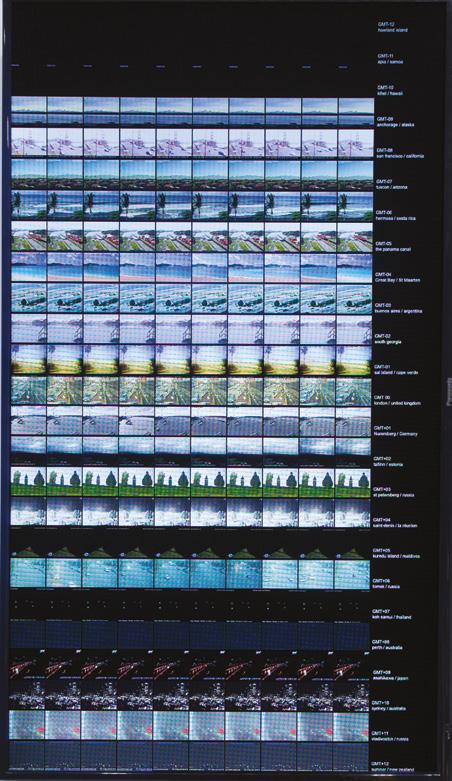
Retreat for the Good Shepherd
2017
Acrylic on board
120 x 90 cm
Lothar Götz is known for his large-scale wall paintings and immersive architectural displays, characterised by the use of vividly coloured abstract geometrical forms, shapes and lines. Götz tends to create his murals by ‘breathing in’ the space, including its architecture, proportions and inconsistencies. He then translates these features into his own visual language, ensuring that his murals become integral to the psychology of the architecture. Strongly influenced by the idea of the ‘Gesamtkunstwerk’ (a total work of art), Götz finds that his passion for theatre, architecture and choreography can be unified through his art.
Retreat for the Good Shepherd (2017) takes its imagery from an installation with the same title, realised by Götz in 2016 at The Collection, Lincoln. The Collection invited the artist to paint a mural inside a 1:1 scale reproduction of the Russell Chantry, a small chapel of Lincoln Cathedral. The murals adorning the chapel’s walls were dedicated to St. Blaise, the patron saint of the wool industry, and executed between 1953 and 1959 by Duncan Grant (1885-1978), a member of the famous Bloomsbury Group. Also this time Götz spent days in the original space, taking in its features, before creating his own temporary version of this sacred place for The Collection.
As the installation Retreat for the Good Shepherd was intended as a temporary piece to be deconstructed after its display, the acquisition of this painting allows The Collection to include a tangible piece in its collection that is representative of the commission. At the same time, the work complements The Collection’s existing holdings of sketches by Duncan Grant and enhances the collection of other contemporary commissions relating to Lincoln Cathedral.
Lothar Götz (b.1963, Günzburg, Germany) lives and works in London and Berlin. He studied at the University of Wuppertal and the Kunstakademie Düsseldorf, and at the Royal College of Art in London. Recent solo exhibitions include Domo Baal, London (2016) and Petra Rinck Gallery, Düsseldorf (2016). In addition to the commission at The Collection and Usher Gallery, Lincoln, Götz has also had several other commissions, including Leeds City Art Gallery (2017); Pallant House, Chichester (2016); Kunsthalle Memmingen, Germany (2015); and the Ministry of Justice, London (2008).
Presented by the Contemporary Art Society, 2016/17

Jack Knox
Cat and Tree (at the Begijnhof Garden) ca. 1973
Acrylic on canvas
100 x 82 cm opposite, top right
Impasse ca. 1970
Acrylic on canvas
153 x 153 cm opposite, bottom
Jack Knox was a ‘painter of visionary clarity’ who, rather than working directly from life, painted from memory. Knox created scenes that demonstrated a return to academic tradition – carefully perceived and well painted while at the same time being slightly surreal and dreamlike, or even tongue-incheek. His work was formed by a combination of Scotland’s painterly tradition, European Modernism, Dutch realism and his own eccentric character. Combining his artistic practice with teaching, it was by surrounding himself with students that he managed to continuously energise and invigorate his work, resulting in work that maintains a vibrancy and a freshness that is in lockstep with the contemporary, despite being made over forty years ago.
Impasse (1970), Cat and Tree (at the Begijnhof Garden) (ca. 1973) and Trellis (ca. 1973) focus on Knox’s practice in the early 1970s, when his output was perhaps at its most progressive. After making abstract works for a number of years, Impasse marks a shift back towards a more figurative style while maintaining the same conceptual rigour evident in his work of the previous decade. The torrent of water crashing into a brick wall on a plain, untreated canvas acts as a visual representation of the frustration felt towards earlier work. This strikingly literal painting shows that his working methods of the 1960s had reached a conclusive moment and with the new decade would come a new direction.
Trellis ca. 1973
Acrylic on canvas
100 x 87 cm opposite, top left
This stylistic change is evident in both Cat and Tree (at the Begijnhof Garden) and Trellis, which each show further developments of Knox’s process. As extraneous details are removed the specifics of each painting become unimportant, leaving an uncluttered and paired back image. Seemingly mundane details like a cat, a tree or a fence give the work a universality that combined with Knox’s sensuous use of colour and form create rich, vibrant and relatable paintings.
The acquisition of Impasse, Cat and Tree (at the Begijnhof Garden) and Trellis for the Gallery of Modern Art (GoMA) helps secure the appropriate legacy of Jack Knox, whose importance to both artistic practice and education in Scotland and beyond should not be underestimated.
Jack Knox (b. 1936, Kirkintilloch – d. 2015, Dundee) studied at Glasgow School of Art, followed by studies in Paris under Cubist André Lhote (1885-1962). In 1965 he joined the staff at Duncan of Jordanstone College of Art and Design, Dundee, and in 1981 became Head of Painting and Drawing at Glasgow School of Art, where he worked until his retirement in 1991. While dedicating a large part of his career to teaching, Knox also exhibited at Fruitmarket, Edinburgh (1983), the Third Eye Centre, Glasgow (1983) and the Serpentine Gallery, London (1971).
Presented by the Contemporary Art Society with the support of Glasgow Museums Contemporary Art Fund, 2016/17
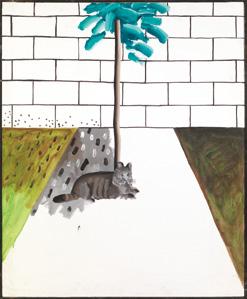
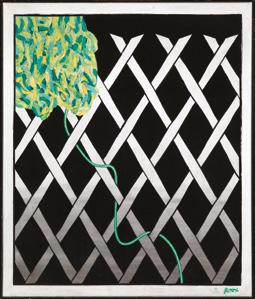

Lubaina Himid
Allow Your Friends to Meet Your Enemies
2011
Acrylic and pencil on paper, collage, magazine pages (2 parts)
33.5 x 28 cm, 71 x 102 cm
Lubaina Himid has strived to make visible the marginalised and silenced histories of Black people through her work. Wearing the cloak of a critical history painter, Himid questions and challenges tradition and dominant narrative. Her subjects are often mundane people who struggle to cope with their lives, articulated by structures of power and wealth, but can also represent important historical figures, such as Toussaint L’Ouverture or Margaret Thatcher. Her work, ranging from paintings, cut-outs and collages to installations, is mostly figurative and has a theatrical quality. It is rich in bright colours and patterns. Ultimately, Himid aims to develop a conversation with an audience, and to ascribe value to Black people’s contribution to Europe’s culture over the past several hundred years.
Allow Your Friends to Meet Your Enemies (2011) is part of Kangas from the Lost Sample Book, a series of diptychs for which Himid drew inspiration from the Whitworth Gallery’s collection of twentieth-century East African kangas, as well as from her own. The paintings echo the various patterns and motifs of the textiles, and feature invented slogans that reference Swahili sayings found on traditional kangas; in this case Allow Your Friends to Meet Your Enemies. A collaged portrait accompanies the painting, imagining the woman who might have owned the kanga. The Kangas series explore the historical relationship between the Greater Manchester textile industry and its East African wearers, and hence address the movements of cultures and commodities, including its related trauma.
As Oldham is situated in the Greater Manchester area, Allow Your Friends to Meet Your Enemies has a close connection
with the Gallery’s locality. Moreover, with the acquisition of this work, Gallery Oldham aims to explore challenging issues around racial, ethnic and cultural identity and to attract new audiences.
Lubaina Himid (b. 1954, Zanzibar, Tanzania) was raised in London by her mother, a textile designer, who inspired Himid to choose an artistic career. Himid studied Theatre Design at Wimbledon College of Art, and Cultural History at the Royal College of Art, London. She was one of the first members of the Black Arts Movement, which was founded in the 1980s, and has since continued to make activist art. Her first major retrospective took place in 2017 in the form of three exhibitions at Spike Island, Bristol; Modern Art Oxford, Oxford; and Nottingham Contemporary, Nottingham.
Presented by the Contemporary Art Society, 2016/17
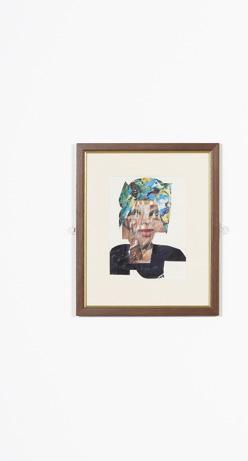
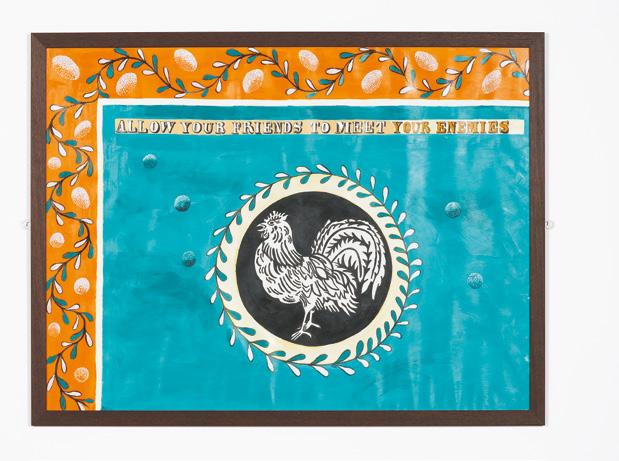
Chloe Dewe Mathews
Private James Crozier, 07:05 / 27.2.1916, Le Domaine des Cordeliers, Mailly-Maillet, Picardie
2014
Digital C-type print
150 x 120 cm
Edition 3 of 5 opposite, top
Soldaat Jean Raes, Soldaat Alphonse
Verdickt, Time unknown / 21.9.1914, Walem, Mechelen, Antwerpen
2014
Digital C-type print
150 x 120 cm
Edition 2 of 5 opposite, bottom
Chloe Dewe Mathews’s captivating narrative photographs focus on notions of identity, memory and history, exploring the relationship between people, places and landscapes. In her research-based documentary practice, which often involves extended periods of travelling, Dewe Mathews seeks to uncover the hidden and unknown through photography.
Dewe Mathews’s series Shot at Dawn, consisting of 23 images, concentrates on the sites at which soldiers from the British, French and Belgian armies were executed for cowardice and desertion during World War I. The images depict locations where the soldiers were held in the period leading up to their deaths or shot. The artist ensured that all photos were seasonally accurate and taken as close as possible to the time of the day at which the executions originally occurred.
Dewe Mathews spent months researching the individual cases, sifting through court-martial documents, using old aerial photographs and monastery diaries to pinpoint the precise locations where each man died. By photographing the sites and giving the works titles that resemble archival labels, Dewe Mathews has reinserted the individual into
Soldat Léonard Leymarie, 16:30 / 12.12.1914, Fontenoy, Aisne, Picardie
2014
Digital C-type print
150 x 120 cm
Edition 1 of 5
that space, stamping the soldier’s presence back onto the land so that their histories are not forgotten.
The three photographs of the Shot at Dawn series acquired for the Graves Gallery are a significant addition to the gallery’s holdings, enabling the further development of the ‘narrative’ and ‘identity’ strands of its contemporary collection. These poignant images complement Sheffield’s existing collection of historic works exploring World War I, offering a fresh and very personal perspective on this world-changing event. The works also augment the museum’s growing collection of contemporary photography.
Chloe Dewe Mathews (b. 1982, London, UK) worked in the film industry before dedicating herself to photography. She was a Robert Gardner Fellow in Photography at the Peabody Museum, Harvard University, in 2014, and won the British Journal of Photography International Photography Award in 2011. Her work was recently exhibited at Ivorypress, Madrid (2016); Irish Museum of Modern Art, Dublin (2016); Bosse & Baum, London (2015); and Tate Modern, London (2014).
Presented by the Contemporary Art Society, 2016/17

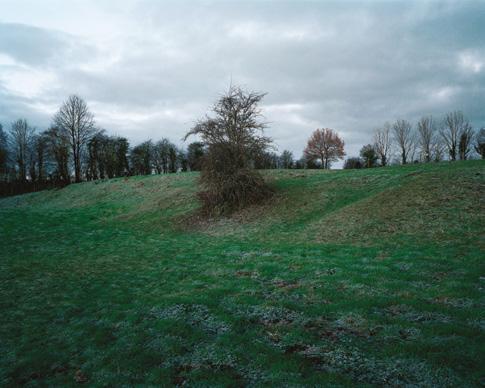
Movie
2015
Edition 1 of 3
Consisting of Movie
Single-channel digital film (colour), sound
39 min 6 sec
Curtain of Circles
2 x cut-out fabric
273 x 250 x 5 cm (each)
Stream of Circles
Fan, cut-out fabric
135 x 230 x 54 cm
Hilary Lloyd makes video and slide installations presenting sequential images that draw attention to unnoticed details in everyday life. The technical equipment Lloyd uses to display images is made deliberately visible to form an integral part of the installation and to engage with the architecture of the surrounding space.
The installation Movie (2015) consists of three components: Movie, a single-screen projection, which combines raw and edited video footage alternating swiftly between static and moving imagery; Curtain of Circles, two cut-out curtains; and Stream of Circles, a fan that blows strips of fabric into the air. The camera travels across flowers, foliage, buildings, illuminated windowpanes and flaring streetlights, images that are interspersed with abstract shapes. The handmade curtains are perforated by circular apertures, evoking a traditional cinema décor and echoing the abstract shapes that appear in Movie. The film is projected just above floor level and recalls a physical drape with its downward flow.
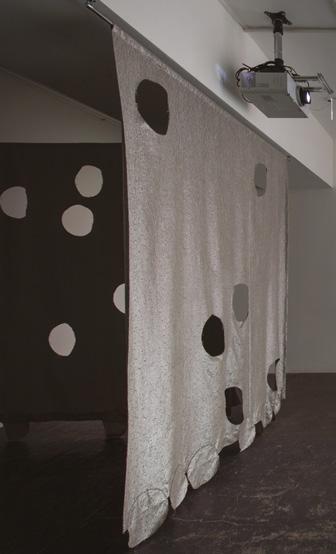
Overall, Movie is embracing the digital, yet referencing the analogue through the basic
technology of its ‘props’ and the raw video footage. The work is visually seductive and with its flow of images and its saturated colours it seems as if we are watching a ‘moving painting’.
Leeds Art Gallery’s collection stream of sculpture in the extended field also involves acquisitions of moving image and soundwork. This also involves purchases of works that operate between painting and sculpture. Movie reflects the digital era in current artistic production, yet the work also has sculptural elements and a painterly sensibility that refer to the analogue world. With its flexible display
conditions, Movie can form an interesting interplay with sculpture and paintings in the museum’s collection.
Hilary Lloyd (b. 1964, Halifax, UK) lives and works in London. She studied at Newcastleupon-Tyne Polytechnic. In 2011 she was nominated for the Turner Prize. Her work has been presented in solo shows at Greene Naftali, New York (2017); Focal Point Gallery, Southend-on-Sea (2017); and the Blaffer Art Museum, Houston (2016). Her work was included in numerous group-shows including Mead Gallery, University of Warwick, Coventry (2017); De La Warr Pavilion,
Bexhill-on-Sea (2017); Glynn Vivian Art Gallery, Swansea (2017); and The Whitworth, The University of Manchester (2016).
Bought with the aid of the Art Fund, the Arts Council/Victoria and Albert Museum Purchase Grant Fund, the Contemporary Art Society and the Leeds Art Fund, 2016/17
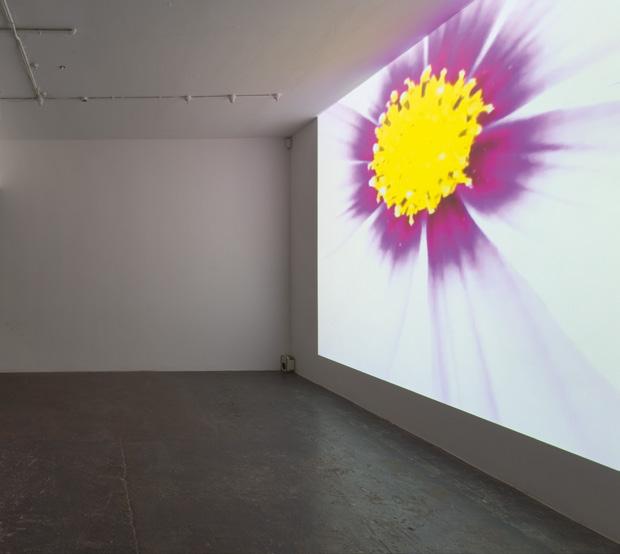
I am IdealEast/ Refugee Crysis/ Kennedy
2015
Ensemble of three paintings on fabric
33 x 143 cm, 114 x 198 cm, 63 x 69 cm
Babi Badalov’s practice is primarily concerned with explorations that test the limits of language and the restrictions it can impose upon us. His ideas are expressed through visual poetry, art objects, installations and performance, and based on linguistic inconveniences that the artist himself has experienced while travelling. At the same time, his work questions the concepts of citizenship and migration and hence addresses current geo-political topics. Marked by displacement, Badalov’s personal life continues to inform his practice. Originally from Azerbaijan, he has spent his life migrating between Russia, the United States, Europe, Asia and the Middle East.
In I am IdealEast/ Refugee Crysis/ Kennedy (2015) Badalov enacts a kind of linguistic play, mixing various languages as well as signs, etymologies and puns. The ensemble of paintings on fabric reflects not only the artist’s years of mourning and imperilment, but also a utopian wish for a future hybrid idiom that is common to all.
The acquisition of I am IdealEast/ Refugee Crysis/ Kennedy is a first step in the process of developing the Middlesbrough collection to reflect the context of Middlesbrough Museum of Modern Art (mima). While the population of Middlesbrough is very diverse, with large numbers of residents from the Middle East and Sub-Saharan Africa, the majority of represented practitioners in the Middlesbrough Collection are from Europe and North America. Presenting this group of works in the new, permanent Middlesbrough Collection display contributes to making mima a space for diversity and cultural exchange, and ensuring that practice from diverse cultures is represented and encouraged.
Babi Badalov (b. 1959, Lerik, Azerbaijan) lives in Paris as a refugee, after having applied unsuccessfully for asylum in the UK. Due to having lived in numerous countries over the years, Badalov speaks Talysh, Farsi, Azeri, Russian, Turkish, English and French. Recent solo exhibitions have taken place at Museo de Arte Contemporáneo de Castilla y León, Léon (2017); Palais de Tokyo, Paris (2016); and Galerie Jérôme Poggi, Madrid and Bogotá (2016). He also participated in group exhibitions such as the 11th Gwangju Biennale (2016); Middlesbrough Institute of Modern Art (2016); and the 6th Moscow Biennale of Contemporary Art (2015).
Presented by the Contemporary Art Society, 2016/17

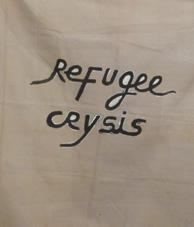
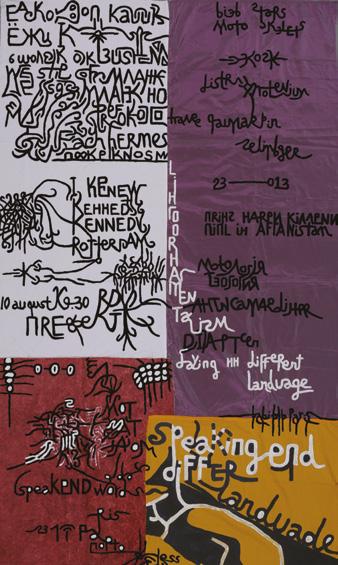
Chantal Joffe
Esme and Alba in Madison Square Garden
2015
Pastel on paper board
37.8 x 47.6 cm
opposite, centre left
Vita Roller Skating
2015
Pastel on paper board
37.8 x 47.6 cm
opposite, bottom
With her paintings featuring primarily women or girls, Chantal Joffe brings a psychological and emotional force to the genre of figurative art and portraiture. The source of her images comes from unposed or unplanned ‘snaps’ of her family, friends, domestic life, and the artist herself, as well as anonymous models sourced from magazines. Through the use of casual brushstrokes and vivid colours, combined with distorted perspectives, Joffe creates contained and provocative portraits.
Three of the four intimate pastel portraits acquired for The New Art Gallery Walsall depict Joffe’s daughter Esme, a subject she has painted over and over again, in different environments, either alone or in the company of a friend. The bright colour palette and the slight distortion of scale and form give these sensual portraits a striking immediacy.
Joffe’s four portraits have strong resonance with The New Art Gallery’s Garman Ryan Collection, donated to the people of Walsall by Lady Kathleen Epstein (née Garman) and sculptor Sally Ryan in 1972. The representation of family members is a common theme in this collection. Sir Jacob Epstein, Lady Kathleen’s late husband, and other artists affiliated with the family, such as Lucian Freud, form a large part of it, as well as images of Lady Kathleen’s children, Theo and Esther Garman. The close emotional connection between Joffe and her daughter make her small-scale portraits a compelling addition to Walsall’s collection.
Esme on the Beach
2015
Pastel on paper board
40 x 30 cm
opposite, centre right
Esme in N.Y.C.
2015
Pastel on paper board
30 x 40 cm
opposite, top
Chantal Joffe (b. 1969, St. Albans, Vermont, USA) lives and works in London. Joffe studied Fine Art at the Glasgow School of Art, followed by an MA in in Fine Art at the Royal College of Art, London. She has had solo exhibitions at Victoria Miro, London (2016) and the Jewish Museum, New York (2015), among others, and has been part of group exhibitions at the National Museum of Iceland, Reykjavík (2016); National Portrait Gallery, London (2015); and Saatchi Gallery, London (2013-2014).
Presented by the Contemporary Art Society with the support of The New Art Gallery Walsall, 2016/17

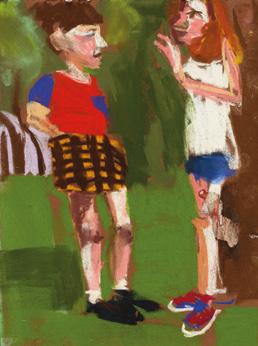
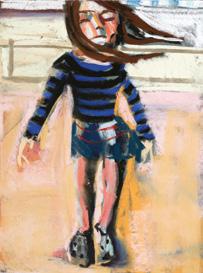
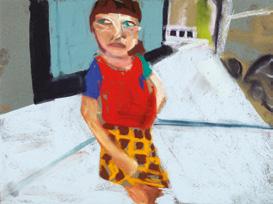
2016
6 black glazed porcelain vessels in a steel frame vitrine and corian plinth
32 x 30 x 7 cm
Edmund de Waal has an enduring love for porcelain, or ‘white gold’, and holds a long fascination with objects. He is not only interested in their touch and form, but also in their ‘lives’ – how they are collected, dispersed or lost. De Waal’s obsession for objects was sparked during his childhood, when he was given a collection of fossils and stones by a local archdeacon. Literature, sound and architecture also serve as vital sources of inspiration for De Waal’s practice.
De Waal is known for his porcelain vessels of neutral colours grouped together in custommade, highly minimalist vitrines. Because of their subtle variations in tone and texture, each pot De Waal produces is unique. With their little dents and pinches, they testify to the beauty of imperfection. The groupings are like rhythms, and the individual vessels notes of a musical composition or words in a poem written by De Waal.
oir-thir (2016) is an elegant steel vitrine with a heavy corian base that holds six cylindrical porcelain vessels in a dark palette. Their black and brown glazes and metallic textures recall found objects, in particular the kind of Neolithic or Iron Age relics previously unearthed on Orkney island. The work has been made especially for The Pier, and is a reposte to the holmr series, shown during wavespeech, an exhibition by De Waal and David Ward at The Pier in 2015. The Gaelic title oir-thir translates beautifully, though loosely, as ‘end of the land’ and picks up on De Waal’s deep interest in language.
The simplicity and elegance of De Waal’s work, together with his interest in engaging creatively with architectural space, offers a contemporary reflection on the Modernist
themes in The Pier’s Collection, principally innovation in materials and experimentation in form. The Pier’s Collection contains works that chart the development of Modernism in Britain, as well as contemporary works that draw on the themes light, colour, landscape.
Edmund de Waal (b. 1964, Nottingham, UK) studied English at Cambridge and trained as a ceramicist in both England and Japan. His work has been exhibited throughout the UK and internationally, with recent exhibitions including Kunsthistorisches Museum, Vienna (2016); Royal Academy, London (2015); and Turner Contemporary, Margate (2014). De Waal is also a writer, having published The Hare with Amber Eyes (2010) and The White Road (2015).
Presented by the Contemporary Art Society with the support of Pier Arts Centre, 2016/17
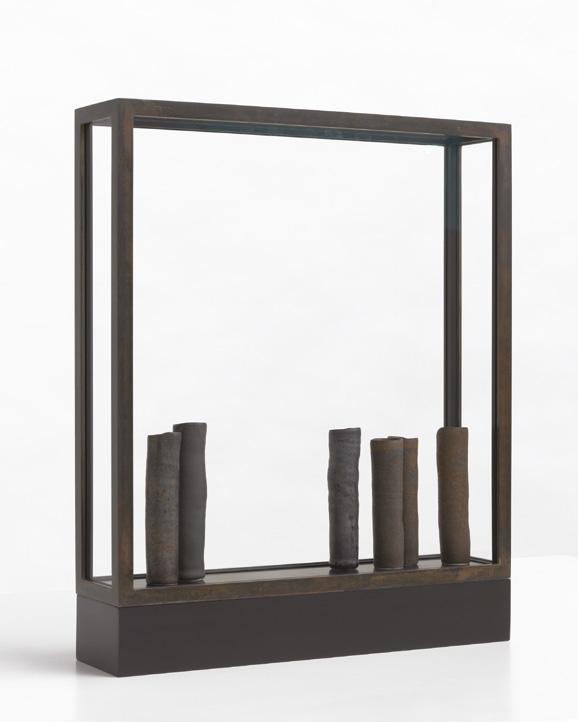
An Oracle’s Vision
2016
Oil on canvas on board
70 x 60 cm opposite, bottom
Ryan Mosley’s paintings depict vividly coloured and multi-layered worlds that are fantastical and hallucinatory, inhabited by imaginary, peculiar figures. They are bearded, afro-headed, or hatted, can be genderambiguous or zoomorphic, and are dressed in eccentric outfits that transcend all trends in fashion. Appearing on the canvas either as part of a scene, or alone as a portrait, they evolve and dissolve and balance between representation and delusion.
In Mosley’s scenes the characters engage in an array of activities, such as dancing, playing an instrument, or simply conversing. There often is an allusion to performance and theatre, emphasised by the subtle presence of a stage or audience, where recurring props vary from cacti to snakes, birds and leafy natural shapes. In his portraits, Mosley depicts fictional characters with traits similar to the figures in his scene-like paintings. Beards can be blue, skins green, and blushes as orange as mandarins. The portrayed figures match or even blend in with their as vibrantly coloured, and often patterned, backgrounds.
In Oracle, the subject has a cloudy black afro that is so substantial in size that it can only but drift off the picture plane, conveying the oracle’s large personality as well as functioning as a weighty visual anchor. The white daubs on either sides of the woman, and the purple smudge on her neck, symbolise the nature of the material in which she is constructed. At the same time, they evoke depth by breaking the flatness of the plane. This motif of the daubs reoccurs in An Oracle’s Vision, this time as a firm painterly mark on the woman’s forehead. Besides its formal purpose, the mark may suggest a narrative.
Oracle 2015
Oil on canvas on board 31 x 24 cm opposite, top
Speculation is encouraged by the woman’s gaze: fixed and without making contact with the viewer. Is she in a trance or meditative concentration, receiving a vision?
Plymouth City Museum and Art Gallery’s collection contains a strong seam of portraiture, dating back to the work of Plymouth’s native Sir Joshua Reynolds (1723-1792). In recent years, Plymouth has begun to augment its collection with contemporary works that question what a portrait constitutes. The addition of Oracle and An Oracle’s Vision is therefore a vital step towards further development of this particular area. As the figures are imagined, and there are hints of narratives but no story, they also form an excellent parallel to Lynette Yiadom-Boakye’s portrait To Tell Them Where It’s Got To (2013), acquired in 2013 with the support of the Contemporary Art Society.
Ryan Mosley (b. 1980, Chesterfield, UK) trained at the University of Huddersfield and the Royal College of Art, London. He lives and works in Sheffield. Recent solo shows include Eigen+Art, Leipzig (2017); Alison Jacques Gallery, London (2016); and Tim Van Laere Gallery, Antwerp (2016). His work has also featured in group exhibitions, including Saatchi Gallery, London (2016) and Galerie Mikael Andersen, Copenhagen (2015).
Presented by the Contemporary Art Society, 2016/17
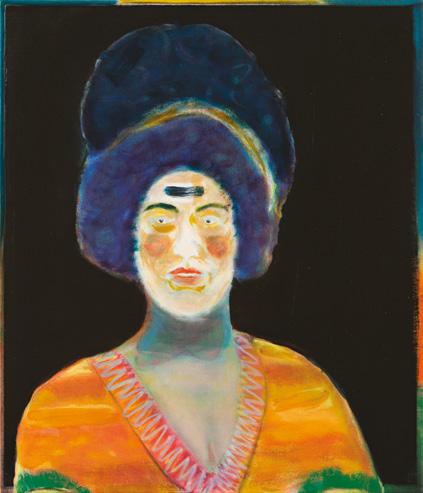
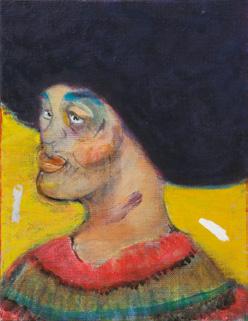
Kate Davis
Eight Blocks or a Field (Bone Doll I)
2013/16
Pencil drawing on paper
Approx 32 x 30 cm opposite, top right
Eight Blocks or a Field (Bone Doll II)
2013/16
Pencil drawing on paper
Approx 32 x 30 cm opposite, bottom left
Kate Davis’s work questions how historical narratives are produced and perpetuated. This has often involved responding to the aesthetic and political ambiguities of specific artworks and their reception, or re-evaluating marginalised historical moments. Informed by successive waves of feminist art and theory, she works across a range of mediums, including drawing, moving image, printmaking and photography. Her art often refers to the body, either through visual representation, as an underlying idea, or the way in which it is created.
For the exhibition Eight Blocks or a Field (Temporary Gallery, Cologne, 2013), Davis made drawings and sculptures as well as a video that reconsider the use value of certain objects that have become redundant or obsolete. Part of this exhibition included a group of four acutely observed portraits of ‘emergent’ dolls, rendered in the style of nineteenth-century French artist Jean-Auguste-Dominique Ingres (1780-1867). The dolls are part of the Edward Lovett Doll Collection, housed in the Museum of Childhood in Edinburgh, and were made from discarded shoes, bones and fabric scraps by children living in deprived areas of London in the 1890s. After originally completing the drawings in 2013, Davis revisited the images while in residence at the Dunedin Public Art Gallery, New Zealand. At this stage the artist added the background settings that were adaptations from portrait drawings by Ingres.
Eight Blocks or a Field (Bundle of Rags)
2013/16
Pencil drawing on paper
Approx 32 x 30 cm opposite, bottom right
Eight Blocks or a Field (Bean Doll)
2013/16
Pencil drawing on paper
Approx 32 x 30 cm opposite, top left
The additions not only ground and provide context for the doll figures, but also allude to class and status, recurrent themes in Ingres’s works.
The Eight Blocks or a Field series are Davis’s first works to join the National Galleries of Scotland (NGS) collection. As the artist lives and works in Glasgow, the acquisition meets the Gallery’s core objective to represent the breadth of Scottish art. It also contributes to the Gallery’s ongoing endeavour to represent work by influential female contemporary artists more widely. Furthermore, the subject matter and form of Davis’s works allow for meaningful links to be made with the historic and portrait holdings of the NGS collection that span the early Renaissance to the present day.
Kate Davis (b. 1977, Wellington, New Zealand) studied at the Glasgow School of Art and now lives and works in Glasgow. She has had solo presentations at venues including Dunedin Public Art Gallery, Dunedin (2016); The Drawing Room, London (2012); and Gallery of Modern Art, Glasgow (2012), and has featured in group exhibitions at Tate Modern, London (2014), and Museo Rufino Tamayo, Mexico City (2012), among others.
Presented by the Contemporary Art Society, 2016
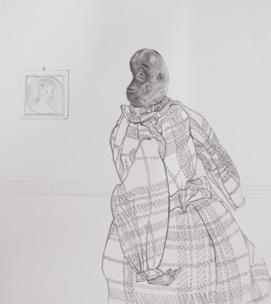
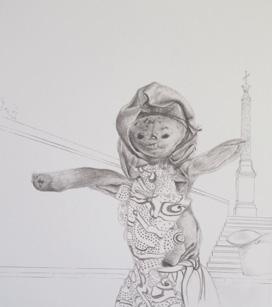
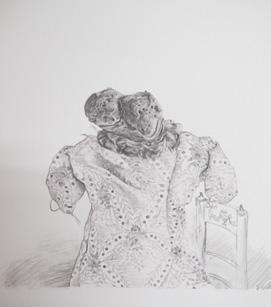

4:3 film, 5:1 surround sound 23 min
Mark Leckey makes work that is both wideranging and multidisciplinary. His practice incorporates sculpture, performance, sound and film, predominantly featuring reconfigured archival video footage. The subject of the work is often concerned with under-represented or overlooked aspects of British culture, exploring ideas about both collective and personal history, desire and transformation.
For Dream English Kid 1964-1999 AD (2015), Leckey reconfigured archival footage from the UK in the 1960s to the 1990s and then combined this with new material including CGI animations. By collaging footage from the Internet, music, films and advertisements, he reconstructs a history of ‘found memories’, focusing on key episodes in his own life from 1964-1999. Fragments include global events such as nuclear bomb tests and news coverage of Korean Airlines Flight 007 shot down by the USSR, as well as events closer to home, notably the footage of gangs of youths in the Toxteth Riots of 1981. A chance discovery on YouTube of a bootleg recording of a 1979 Joy Division concert in a club in Liverpool, which he in fact attended as a teenager, inspired Leckey to make the work. While the film can be seen as an autobiography of sorts, it also explores ideas around identity, the individual and collective memory.
The artist’s interest in the power of images and objects is reflected in recurring motifs such as a pylon, which represents his interest in animism and the peculiar qualities of everyday objects. References to the moon and lunar eclipses indicate a fascination with the celestial and the ways in which we connect to the universe.
The acquisition of Dream English Kid 1964-1999 AD significantly strengthens the representation of Leckey’s work within Tate’s collection. It provides Tate with the opportunity to show the work in a wide variety of contexts, namely film, video and photography, works concerned with individual or collective memory, and works that use found footage or deal with digital/post-Internet issues.
Mark Leckey (b. 1964, Birkenhead, UK) lives and works in London. He won the Turner Prize in 2008 for his work Industrial Light and Magic (2008), and has had solo exhibitions at various international galleries and museums including MoMA PS1, New York (2016); Secession, Vienna (2015); Haus der Kunst, Munich (2015); WIELS Contemporary Art Centre, Brussels (2014); and the Serpentine Gallery, London (2011).
Purchased with the support of the Contemporary Art Society, 2016/17
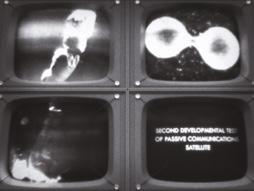

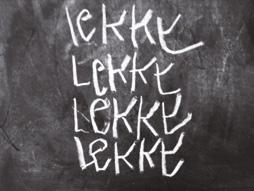


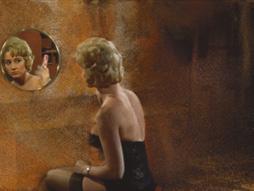
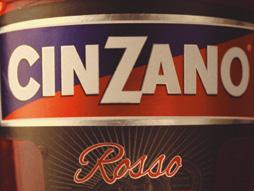

Jessica Warboys
Sea Painting, Birling Gap, 2017 2017
Mineral pigments on canvas
Approx 1100 x 200 cm
Opposite: Collage by the artist documenting the making of the work on site
Jessica Warboys is a British artist whose practice employs a variety of mediums ranging from sculpture, film and performance to large format canvases she titles Sea Paintings. Her work often departs from personal or collective memories, be they historical, mythical or fictional, and her materials are often partnered with a natural element, such as the sun or the sea.
Sea Painting, Birling Gap, 2017 (2017) was made at Birling Gap, an enclosed beach set below white chalk cliffs, near Eastbourne. Working on the shoreline, Warboys created the painting by casting and rubbing pigment onto swathes of raw canvas that are submerged and pulled from the sea. The process is closely linked to performance, the ‘painted’ canvas revealing the action of making and the contingencies of that specific time and place –the wind, waves, rocks and tidal sea pools that disperse and drag the pigment into the creases and pores of the canvas. The resulting work functions as a record of her collaboration with the landscape, in this instance somehow picking up the chalk fallen from cliffs into the sea and the rocky plateaus and sea-water pools that make up the shoreline.
These Sea Paintings are central to Warboy’s work, existing at the crossroads of ritual, performance, improvisation and artistic process. It is an approach to making that seeks to manifest the physical and psychic dynamics that give a landscape its shape and meaning. They engage very directly with that border territory between the sea and land, the ‘edge in landscape’, that from the beginning has been at the heart of Towner’s Collection.
Jessica Warboys (b. 1977, Newport, UK) is based in Berlin and Suffolk. She studied at Falmouth School of Art, and Slade School of Fine Art, London. Recent solo exhibitions include Tate St Ives, Cornwall (2017); Kunstverein, Amsterdam (2016); Kunsthall Stavanger (2016); and Museum Leuven (2015). Warboys was selected for Artists Film International, Whitechapel Gallery, London (2013), and participated in dOCUMENTA 13, Kassel (2012).
Presented by the Contemporary Art Society, 2016/17

Guy Moreton
KS01, The Orchard, Langdale 2012
2012
Museum framed C-print
78 x 102 cm opposite, top
Guy Moreton’s work engages with the cultural histories and representation of landscape, particularly with its relationship to thought in literature, art and philosophy. For several years, Moreton has been drawn to landscapes that have had a major impact on male European émigré thinkers for whom exile, or displacement, has served as an intellectually creative condition, such as Austrian-British philosopher Ludwig Wittgenstein (1889-1951), the German writer W.G. Sebald (1944-2001), and the German artist Kurt Schwitters (1887-1948).
KS01, The Orchard, Langdale 2012 (2012) and KS02, The Wilderness, Langdale, 2012 (2012), the two large-scale photographic works that have been acquired for Tullie House Museum and Art Gallery, explore the landscape which shaped German artist Kurt Schwitter’s final artistic practice in the Lake District. Moreton’s photographs depict a section of the overgrown apple orchard in winter at the Cylinders estate in Elterwater, where Schwitters spent the last years of his life working on his fourth and final Merzbau. A continuation of his original Hanover Merzbau, large architectural constructions that transformed the interiors of his parent’s house, the Elterwater Merz Barn (1947-1948) comprises an abstract threedimensional collage of found objects and organic debris from the area. Schwitters used the word ‘Merz’ to describe the process of combining fragments to make a new whole to signify the shattering of existence by war or other circumstances, as well as the artist’s ability to heal by combining these elements.
Tullie House museum has developed a contemporary art collection relating to the landscape and natural world to build on the museum’s extensive collection of historic
KS02, The Wilderness, Langdale, 2012
2012
Museum framed C-print
78 x 102 cm opposite, bottom
landscapes. Guy Moreton’s work enhances the museum’s focus of contemporary Cumbrian landscapes and fills an important gap by responding to Kurt Schwitter’s Elterwater Merz Barn and its relation to the natural environment. Moreton’s photographs also contribute to the important story of the Lake District, which has inspired art, literature and thought since the eighteenth century.
Guy Moreton (b. 1971, Lincoln, UK) is an artist and Associate Professor and Course Leader of the MA Photography Programme at the Southampton School of Art and Design, Solent University. He studied Photography and Fine Art, and is co-author of Ludwig Wittgenstein – There Where You are Not (2005). His photographic work has been published and exhibited widely. Recent exhibitions include Solent Showcase, Southampton (2016); The Bonington Gallery, Nottingham Trent University, Nottingham (2015); and The Hatton Gallery, Newcastle (2014).
Presented by the Contemporary Art Society, 2016/17

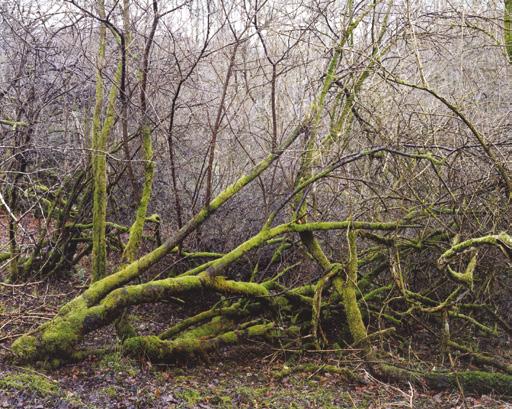
‘The acquisition of my work has enabled the Williamson to create an exciting juxtaposition of my vessel, depicting the often overlooked stories of young women today, with the museum’s historical Della Robbia pottery, which I have long admired. I am pleased, proud and grateful to the Contemporary Art Society for allowing my work to join a national collection in the North of England.’
Emilie Taylor, ArtistPaper Necklace
2015
Reinforced paper and elastic thread
Length 60 cm
Nel Linssen’s paper jewels are beautifully intricate and distinctive, and form a pioneering force in modern jewellery. By means of folding, Linssen transforms everyday material paper into wearable, elegant objects. While Linssen’s unique approach is primarily intuitive and empirical, claiming that the use of paper is an obvious means of expressing herself, it was also based on substantial research and haptic knowledge. She always attempts to discover logical constructions that were inspired by structures and rhythms of the botanic world.
The colours, patterns and textures of her bracelets and necklaces are best revealed when worn, since the slightest movement uncovers subtle alterations in the pieces and highlights the beauty and sensuality of her work. The relationship between wearer and viewer is therefore pivotal to Linssen’s jewellery.
Paper Necklace (2015), a late work by Linssen, is highly characteristic of her oeuvre. The necklace articulates a nearly serpent-like structure in which differently sized groupings of light grey and brown folds alternate in a repetitive manner. To us, the necklace seems an ingenious, complex construction, whereas to Linssen it must have been straightforward and simple.
As Linssen was one of the iconic jewellery designers of our time, Paper Necklace is an obvious choice to add to Aberdeen’s extensive jewellery collection. Moreover, the paper allows Aberdeen to expand upon the range of mediums already present in its jewellery collection, such as metals, plastic and leather.
Nel Linssen (b. 1935 – d. 2016, Nijmegen, the Netherlands) trained at the Academy of Fine Arts in Arnhem. Her work is represented in leading design and jewellery collections around the world, including Victoria and Albert Museum, London, The State Hermitage Museum, St. Petersburg, and Stedelijk Museum, Amsterdam. In 2014 she donated a large collection of her jewellery that spans thirty years of her practice to the Museum Het Valkhof, Nijmegen.
Presented by the Contemporary Art Society through the Omega Fund, 2016/17

Ferrari Red Vessel
2014
Earthenware and automotive paint
28 x 42 x 36 cm
The ceramic vessels by Ann van Hoey are minimalistic and precise, and so flawless that they appear to reach unrivalled perfection. Their form emerges from a geometric logic; origami-like incisions interfere beautifully with their pure, originally circular shape.
Throughout her practice, Van Hoey employs a technique she has developed herself – she exclusively uses brown clay. She rolls large flat slabs, places these into bowl-shaped moulds, and subsequently cuts the resulting hemispheres of clay with scissors, folding the different ends together. In doing so, Van Hoey focuses specifically on the edge of the hemispheres with the aim to arrive at a synthesis of round and angular shapes.
Ferrari Red Vessel is an example of this, yet this time the vessel has not retained its usual earthy tone. Instead it has a bright red surface that resembles the glossy coating of a Ferrari car. Van Hoey has thus cleverly merged the traditional craftsmanship of making earthenware vessels with the lush status symbol of modern society and capitalist consumerism. This paradoxical yet seductive combination challenges the beholder to reflect upon the balance between tradition and progress, in ceramics and beyond.
Ferrari Red Vessel resonates with several elements of Aberdeen’s collection. Throughout its collecting history, Aberdeen has laid particular emphasis on art and craft from Northern Europe, and Van Hoey is of Belgian origin. With its origami-like slits, the work also subtly references Aberdeen’s Oriental Collection of decorative art, which contains craft from Japan, China and India. Moreover, the vessel’s dynamic red colour taps into the vital questions stipulated in the museum’s
craft acquisition policy, such as how colour is achieved by the maker and what it suggests.
Ann van Hoey (b. 1956, Mechelen, Belgium) only became a full-time ceramicist when she was 50 years old, having practised ceramics as a hobby previously. In 2006 she obtained a degree in Ceramics from the IKA (Institute for Arts and Craft) in Mechelen, and soon she began to receive international recognition, winning awards in Korea, Germany and Italy. Her work has been featured in various group exhibitions, including Taiwan International Ceramics Biennale, Yingge Ceramics Museum (2016) and The Salon Art + Design, New York City (2016).
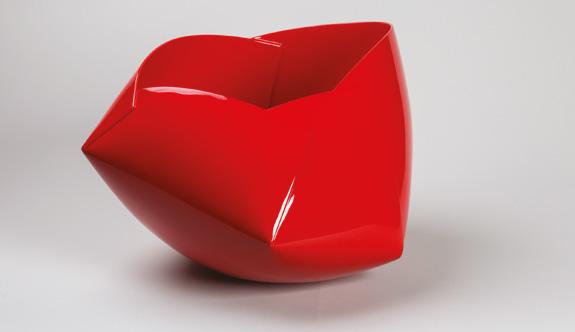
2015
Glazed earthenware
34 x 43 x 24 cm
James Rigler’s ceramic sculptures are reminiscent of monumental architectural elements and ornaments, yet high gloss surfaces and pastel or bright colours disclose their contemporary nature. They are often large in scale, and made from clay, supported by everyday materials. While creating his pieces, thoughts of ruined and abandoned ancient places, romantic landscapes and stage sets tumble through Rigler’s head. Aiming to blur the boundaries between significant pieces of architecture and everyday things, the artist creates works that take on the form of recognisable functional objects or architectural accessories. However, removed from their original context, Rigler’s sculptures adopt new meanings, thereby questioning architecture and decoration as well as its meaning.
Black Feet (2015), a pair of shiny black ceramic lion paws, developed from Rigler’s reflection on Empire furniture, where clawed feet are a frequent feature. Through the pristine, high-gloss glaze and the brocadelike rope trimmings, Black Feet also alludes to military boots. The combination of the lion’s paws with a boot-like form evokes unexpected narratives, and may even hint at the uncanny affinity between feet and shoes prevalent in surrealist art.
Brighton’s crafts collection includes works by leading national and international makers who have been influential in the development of British contemporary craft. In light of this, the acquisition of Black Feet, a contemporary piece by a young maker, is a vital addition to the collection, and relates to the important theme of ‘subversion’ within Brighton’s collection. Moreover, there is a relationship of Rigler’s work to the built environment, and
a resonance of Black Feet’s hybrid shapes and high gloss surfaces with the interiors of the Royal Pavilion.
James Rigler (b. 1978, New Zealand) is based in Glasgow. Rigler studied 3D Craft at the University of Brighton and obtained an MA in Ceramics & Glass from the Royal College of Art, London, in 2007. In 2013-2014 Rigler undertook a six-month ceramics residency with the Victoria and Albert Museum, London. His practice is often informed by work as a model maker and mould maker in the architectural ceramics industry. Solo exhibitions include Marsden Woo, London (2015) and Tramway, Glasgow (2015).
Presented by the Contemporary Art Society through the Omega Fund, 2016/17

2016
Glazed porcelain (thrown and freely assembled)
Approx. 45 x 32 x 35 cm
Inspired by museum collections of historical dining vessels, in particular from the eighteenth century, Louisa Taylor explores the rituals of eating and taking tea as well as the role of tableware in contemporary dining. Her distinctive colour palette is influenced by hand-painted decoration on historical pieces. On investigating such work, Taylor says: ‘I deconstruct each individual colour and match it with glaze. I use the content of the decoration to inform the overall composition of the piece and combine this with honed forms’. She aims to create objects for the home that are not intended to prescribe specific functions, but instead encourage sharing and relaxed eating. Each of Taylor’s pieces is made from porcelain and thrown on the potter’s wheel. She creates components which she then cuts, freely assembles and finishes by hand.
Sophie Tea Set is a conclusion of a research project that Taylor started in 2012 as artist in residence at the Victoria and Albert Museum (V&A), London. The set is an interpretation of an eighteenth-century centrepiece by the Meissen Factory, part of the V&A collection. The decoration and layout of the Meissen tea set informed the overall composition of Taylor’s contemporary assemblage of vessels. The tray on which the tea set is presented has plinths built in to elevate the key components in the tea ceremony and to create a sense of grandeur and occasion.
Sophie Tea Set links strongly to both Bristol Museum & Art Gallery’s historic porcelain collection and the 1960s and 1970s tea and coffee services by the Crowan Pottery and Robin Welch, which form part of the studio pottery collection. Sophie Tea Set importantly
documents the movement away from Leach style ‘brown’ stoneware to the exploration of a wider range of materials and concerns in contemporary pottery.
Louisa Taylor (b. 1980, Yeovil, UK) is based in London and combines the making of ceramics with teaching and writing. She is a Lecturer on the BA (Hons)/MDes 3D Design and Craft course at the University of Brighton, and the author of Ceramics: Tools and Techniques for the Contemporary Maker (2011). Taylor acquired a BA degree in Ceramics at Bath Spa University, followed by a MA in Ceramics and Glass at the Royal College of Art, London.
Presented by the Contemporary Art Society through the Omega Fund, 2016/17
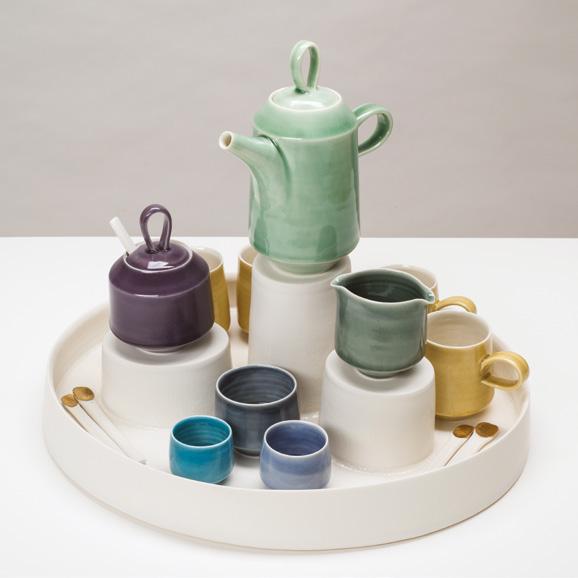
3D printed in ZCorp High Performance Composite
25 x 18 x 15 cm
In his practice, Conor Wilson explores the relationship between nature and culture through the concepts of ‘the wild’, ‘the domestic’ and ‘the pastoral’, while expressing his own particular take on the world. He strives to produce work that is relevant to its time, yet that also emphasises the value of the handmade in a post-industrial society.
Garden, a work of exquisite texture and detail, is a 3D printed object that Wilson made in collaboration with the Centre for Fine Print Research, University of the West of England, Bristol. The piece is inspired by Infants with Goat (ca.1770), a William Cookworthy porcelain group that belongs to Bristol Museum & Art Gallery’s collection. For Garden, Wilson has reinterpreted the main features of the eighteenth-century figure group: a tree backing the figures, the rococo style base, and the representation of the goat. The main elements of Garden are 3D copies of real objects: the trunk is a copy of a laurel tree’s branch from the artist’s garden, while the base is a direct copy from an existing clay object, made from clay dug from beneath the tree. However, the image of the goat was sourced from the Internet and the cloud taken from a photo of the sky above the garden. Garden plays with the question what is real and what is artificial, what is clay and not clay, and hints at the myths of sacred and profane love which inform the eighteenth-century genre.
Garden is the first 3D printed work to be added to Bristol Museum & Art Gallery’s collection, and in fact the first piece produced by the Centre for Fine Print Research to be represented in a museum collection. As the
work directly engages with a historic piece in the collection, Infants with Goat, it manages to reactivate Bristol’s holdings.
Conor Wilson (b. 1964, Belfast, Ireland) is based in Bristol and combines his ceramics practice with teaching. He is currently course leader for the MA Ceramics at Bath School of Art & Design. Wilson obtained a BA in 3D Design (Ceramics) from University of West England, Bristol, and an MA Ceramics from the University of Wales Institute, Cardiff. He produced several large-scale public commissions before concentrating on the production of smaller works. Recently, he completed a practice-based PhD at the Royal College of Art, London, titled Writing Making: Object as body, language and material.
Presented by the Contemporary Art Society through the Omega Fund, 2016/17

Assemble
Granby Workshop, First Collection: Products and Process
2015
Mixed mediums
Dimensions variable
Assemble, a collective working across the fields of architecture, design and art, have developed a social enterprise in Liverpool’s Toxteth area, called Granby Workshop. Within Granby Workshop the collective works with local people and arts graduates to design and produce ‘products’ that use the materials of the area, which for a long time has faced dereliction. The resulting pieces are functional objects of art and craft, made with simple techniques and unusual materials. The process of making these works offers people new skills, while their sale raises awareness and income; profits go directly back to the community from which they come.
Granby Workshop, First Collection: Products and Process (2015) is a body of works, including the trials, prototypes, moulds and documentation, which shows the development and collective working process of the Granby Workshop. The collection features the four key product lines: ceramic doorknobs, a mantelpiece and lights made from the ‘Granby Rock’, collaged tiles and printed fabrics. These works are accompanied by initial tests and prototypes, alongside the tools and moulds used, as well as the instruction manuals and documentation, including printed materials, digital images and videos.
As Assemble have now decreased production to hone the making processes and improve their financial stability, it is the perfect time to acquire a collection of the pieces, processes and stories behind them for Middlesbrough Institute of Modern Art (mima). Products from Granby Workshop complements Middlesbrough’s existing collection, as it highlights processes and techniques involved in the production of craft. Furthermore,
the work bridges some of the key areas in the collection – ceramics, drawing, prints and more conceptual work – and offers a contemporary take on some of the craft pieces in the collection. As a prime example of Arte Útil, or useful art, the work ties in with mima’s current vision in which the museum has a useful, socially-responsive programme, where the collection is used as a tool for teaching.
Assemble, comprised of eighteen members, began working together in 2010 and are based in London. Assemble’s working practice seeks to address the disconnection between the public and the process by which places are made. Assemble won the Turner Prize in 2015 with the Granby Workshop project, and have worked on many notable projects across the UK, including The Cineroleum and The Brutalist Playground
Presented by the Contemporary Art Society through the Omega Fund with the support of Middlesbrough Institute of Modern Art, 2016/17
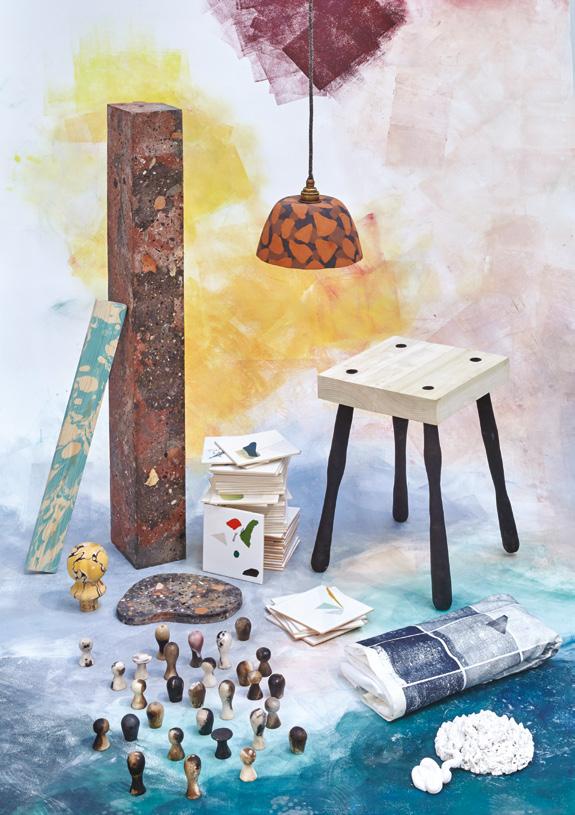
Neil Brownsword’s ceramic installations present a socio-political commentary on the decline of the British ceramic industry in his home town of Stoke-on-Trent. The industrial area became a centre of ceramic production in the early seventeenth century because of the local availability of clay, lead, coal and salt. Adopting the role of both artist and archaeologist, Brownsword unearths discarded byproducts from the closed Staffordshire potteries and uses these materials to create sculptures. His work reflects on the inevitable effects of global capitalism which continue to disrupt indigenous skills and a heritage economy rooted in North Staffordshire for nearly three centuries.
Waster (2011) is comprised of detritus that Brownsword has salvaged from various shutdown ceramic factories in Stoke-on-Trent. He has glazed and re-fired this material, fusing it together with ‘shraff’ or ceramic landfill, and has composed these transformed fragments into a sculpture that cite taxonomies of industrial archaeology. The title of the work directly references the term ‘waster’, which is used in this industry to describe a broken or ‘failed’ object which is subsequently discarded.
It was the collections of The Potteries Museum & Art Gallery, based in Stoke-on-Trent, that specifically inspired Brownsword to make Waster. The Potteries has a renowned collection of Staffordshire ceramics and at the same time remains a key repository for the archaeology of the pottery industry in the region. The acquisition of Waster is an important update of the museum’s existing holdings, showing how ceramics and pottery have stretched into the contemporary realm. The acquisition of Brownsword’s installation
also strengthens one of the museum’s collections priorities to support local artists with a link to the pottery industry.
Neil Brownsword (b. 1970, Stoke-on-Trent, UK) trained at Josiah Wedgwood & Sons at the age of 16, and continued his studies at the University of Wales, Cardiff, and the Royal College of Art, London. He is Professor of Ceramics at Buckinghamshire New University and Bergen Academy of Art and Design. His PhD thesis, completed in 2006, combined historical and archaeological research on ceramic production in North Staffordshire from the eighteenth century to the present and the film archiving of craft skills in the industry today. Brownsword has exhibited both nationally and internationally, and was awarded with the prestigious Grand Prize at the 8th Gyeonngi International Ceramic Biennale, South Korea, in 2015.
Presented by the Contemporary Art Society, 2016
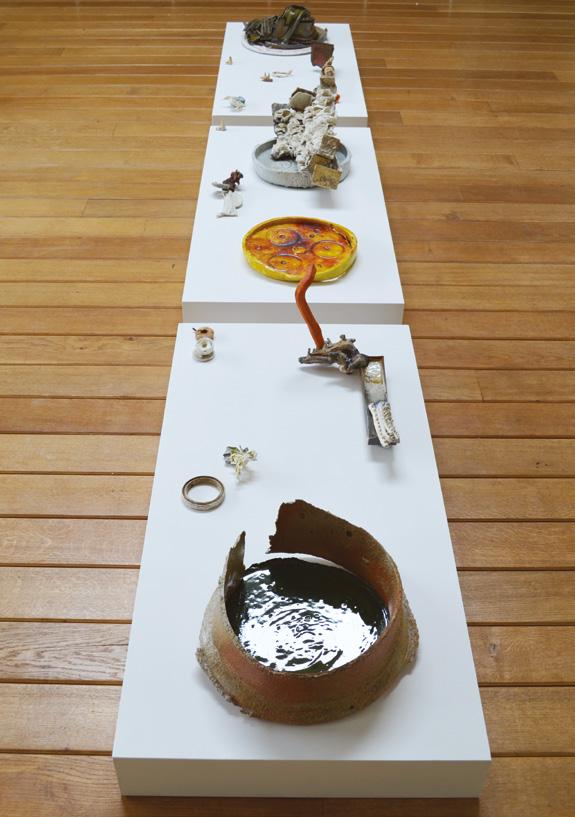
2016
Handbuilt slip decorated stoneware with oxide and lustre
110 x 50 x 50 cm
Emilie Taylor’s ceramics have a traditional English allure that contrasts bravely with contemporary engraved scenes of figures in post-industrial landscapes, typical for British towns. Taylor uses heritage craft processes, in particular traditional slipware, to explore and interpret these environments and their inhabitants. Her work with local communities often informs her practice.
For a commissioned exhibition, Taylor has created a body of work called Edgelands, referring to ‘people who are existing in gaps’. The stories told are multi-layered, addressing subjects such as coming of age, fertility, exploitation and the hardships of a less privileged environment. They draw on Taylor’s observations from her past and present life, and have been translated into two different strands of pots. One strand references youth, or ‘the daughter’, the other suggests early maturity, ‘the mother’. The women in the portrayed scenes are inspired by poetry and classical mythology, continuous undercurrents in Taylor’s oeuvre. The girls reference Persephone, a Greek goddess associated with fertility, while the maternal figures allude to Demeter, goddess of the harvest and Persephone’s mother.
Fields of Gold (2016) belongs to the strand of work featuring the Persephonic girls. The scenes echo Taylor’s teenage memories, when she used to hang out in a Sheffield park with friends, dressed in leggings, vests and trainers. The depicted girls are in similar dress, hanging on monkey bars in a playground or running around with arms spread out, as if they are flying. Fields of Gold displays a scene that does not capture one moment in time, but rather several moments
like consecutive slides of a filmstrip melding into one panorama. The filmstrip quality may suggest motion, progress perhaps. The girls are at the edgelands of childhood, full of dreams and expectations in spite of little prospect for the future. The work’s colour scheme enhances the sense of youth: it is executed in lemon and yolk-orange, with planes of gold lustre, and the girls appear sun-drenched.
Fields of Gold, a combination of traditional technique, contemporary subject matter and classic storytelling, relates closely to several elements of the Williamson Art Gallery’s collections and also resonates on a local level. Taylor uses the ancient sgraffito technique, which was the principal means of decoration for the Della Robbia Pottery, Birkenhead’s contribution to the Arts & Crafts movement. The inclusion in her work of decorative scrolling flower patterns around the neck of each vase links to the patterns of William Morris. The fact that Taylor was a student in Liverpool also provides a direct local connection.
Emilie Taylor (b. 1980, Sheffield, UK) is a ceramic artist and social worker. She holds an MA in Art Psychotherapy and a BA in Fine Art. Taylor has had several residencies in the UK and abroad, and has exhibited at Arts & Crafts House Blackwell (2015); Chatsworth House, Derbyshire (2014); and Yorkshire Sculpture Park (2012). Edgelands toured through the UK in 2017, venues including Gallery Oldham, The Potteries Museum & Art Gallery, Stoke-on-Trent, and the Williamson Art Gallery, Birkenhead.
Presented by the Contemporary Art Society through the Omega Fund, 2016/17
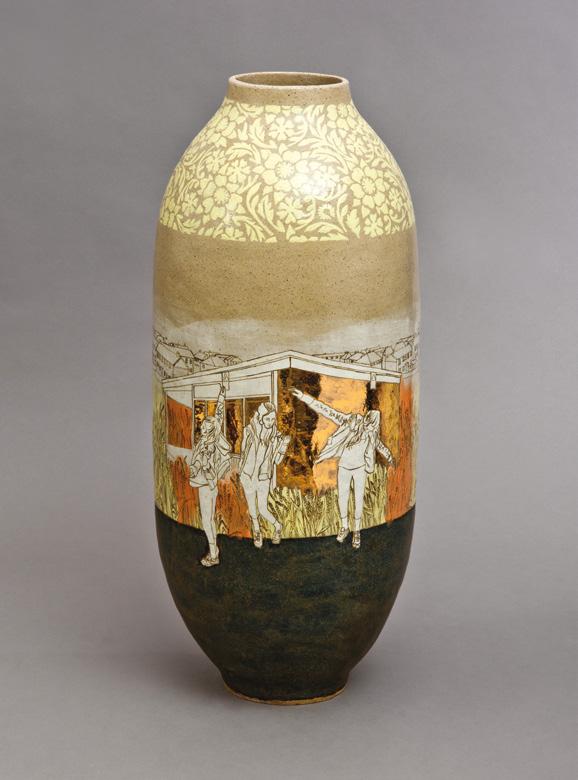
‘It has been fantastic to see Ryan Mosley’s career develop since his first exhibition at the Graves Gallery in 2004 and we are thrilled to have been gifted two of his works for Sheffield’s collection. His paintings not only augment the growing contemporary collection, but also provide a fascinating dialogue with Sheffield’s historic portraits.’
Sian Brown, Head of Collections, Graves GalleryRyan Mosley
Distant Ancestor VII
2011-2012
Oil on linen on board
120 x 100 cm opposite, top
Ryan Mosley painted these series of large, enigmatic portraits with the intention to create a visual, though fictional, family tree. By using an oval canvas as the base for his portraits, a historic pictorial device, Mosley deliberately chooses to escape from the ‘the constraints of modernity’, as he formulates it. At the same time, however, by portraying the figures in his own distinctive painterly style, Mosley renders the works contemporary and avoids employing the principles of traditional portraiture. Mosley explores the paradox between historic and contemporary portraiture that is inevitably at the heart of these works.
While Mosley was creating this fictional family tree, the BBC broadcast Who do you think you are?, a show in which celebrities trace their ancestry and uncover past secrets. Mosley was also inspired by his own family’s search for its ancestors. His grandfather had attempted to retrace their family tree, secretly hoping to discover that the family were descendants of an influential sixteenth-century earl. Although it was not a futile attempt –according to Mosley ‘he unearthed that they had been standing in the same muddy field for the last couple of hundred years’ – his initial hopes were dashed. His grandfather’s imagined idea of who his ancestors could have been made Mosley realise that the portraits he has painted, although fictitious, allude to the infinite possibilities of an unknown past.
Distant Ancestor VII and Distant Ancestor
XIII, gifted to the Graves Gallery: Museums Sheffield by Ryan Mosley, reveal not only the endless possibilities of earlier times but also the importance of the search for lineage,
Distant Ancestor XIII
2011-2012
Oil on linen on board
120 x 100 cm opposite, bottom
belonging and identity. This theme of identity finds resonance in Sheffield’s art collection, where the subject is a thread, which runs from early portraits from the eighteenth century up to the present. In more recent years, Museums Sheffield has focused on collecting works which interrogate what identity means and how it is constructed, exploring the tension between personal, political and national identity as well as how collective identity is created. These two works not only extend Sheffield’s contemporary collection, joining works by artists including Sutapa Biswas, Hew Locke, and Kate˘rina Šedá, but also provided a fascinating counterpoint to the historic portraits in the collection.
Gifted by Ryan Mosley through the Contemporary Art Society, 2016/17
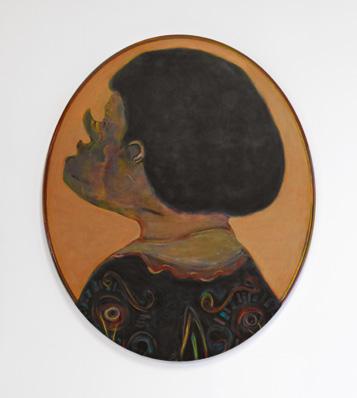
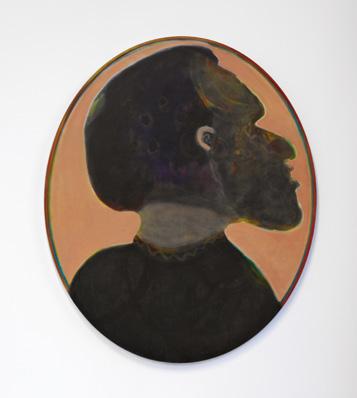
Polycarbonate and cast polyurethane rubber
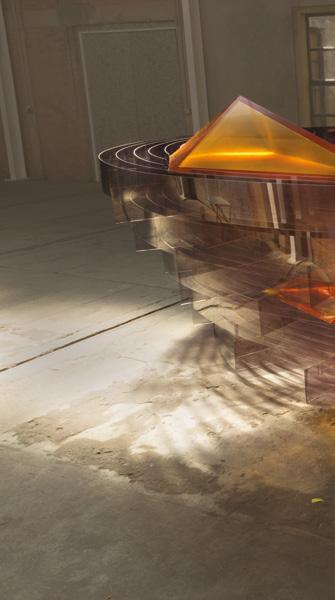
120 x 470 x 370 cm
Dualities – of materials and forms – are characteristic of Wilding’s sculptures that have been constant throughout her career. Wilding explores her fascination with the physical qualities of materials, and their contrasts and relationships, through the use of both traditional and contemporary sculptural methods such as modelling, casting and carving. She often works on a monumental scale, using a wide array of materials, including steel, brass, alabaster, wood and rubber. While her work is always powerfully allusive, conjuring visual metaphors in a way comparable to work by Richard Deacon, Wilding’s sculpture is entirely abstract. It operates on its own terms without the need to be ‘about’ anything other than itself, and the conditions of its making. Wilding’s insistence on surface embodies her desire to reveal and explore what is hidden.
Arena (2000) is different from Wilding’s robust sculptures in that it presents us with mass without weight, scale and form with lightness and transparency. Made from concentric bands of transparent grey acrylic, the sculpture rises, billowing out from a narrower base, each new layer slotting in to the one below on lateral struts. Balanced on the rim of the sculpture, as well as nestled inside, are amber wedge-shaped resin lozenges. Their quality of holding light sets up a tension between these two cast elements, two static points in contrast to the restless dynamism of the layered, circling acrylic elements. The work draws the eye to scan across it again and again, interrogating its complexities.
Together, Leeds Art Gallery and the Henry Moore Institute have built one of the strongest public collections of British sculpture in the UK. Arena is a lasting legacy and major work
by a leading British sculptor, and therefore represents an important contribution to the collection of abstract sculpture.
Alison Wilding (b. 1948, Blackburn, UK) studied at the Ravensbourne College of Art, Bromley, and the Royal College of Art, London, and is based in London. She has been making sculpture since the late 1970s, and rose to prominence in the 1980s. She was nominated for the Turner Prize in 1988 and 1992. Recent
solo exhibitions include Art House Foundation, London (2016); Tate Britain, London (2013); The Whitworth, The University of Manchester (2013); and New Art Centre, Roche Court Sculpture Park, Salisbury (2011).
Gifted by Simmons & Simmons through the Contemporary Art Society, 2016
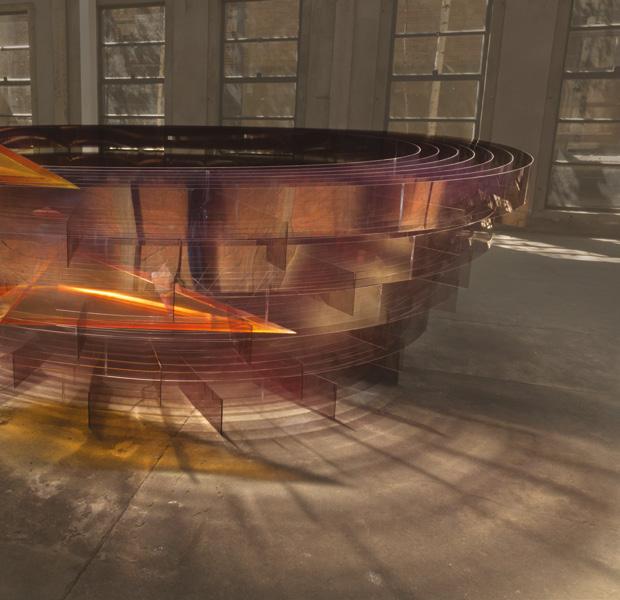
‘The Contemporary Art Society’s reputation and connections in the contemporary art world seem to me to be unrivalled; in making personal visits to galleries and to artists’ studios the respect in which their consultants are held is very obvious.’
Stephen Barber, Group Managing Director, Pictet & CIE
Our Art Consultancy work goes from strength to strength, with a number of new clients over the past year and an influx of high-profile projects. Producing great art for great places is our goal, and with the public realm being increasingly seen as a platform for culture in its widest sense, bringing contemporary art to new audiences is the hallmark of our work. As importantly, these commercial projects support our contemporary art ecology – over £3 million in project budgets supported artist production in 2016.
Cultural place-making is a primary focus in the real estate and urban planning sector, and our strategy work is helping landowners, developers and local authorities across London and the UK understand how public art and cultural programming can contribute to an authentic sense of place and establish cultural ecologies. An influential commission has been our cultural strategy for Mayfair and Belgravia in London for Grosvenor Estate, which celebrates a distinctive heritage context while building a reputation for contemporary, forward-looking and inclusive cultural initiatives. We are now supporting Grosvenor in delivering the vision with a further appointment to develop a public art strategy for the masterplanning of Berkeley Square.
We are working with the City of London to develop the cultural animation strategy for their Cultural Hub, which sees the public realm as an essential platform to link internationally reputed cultural institutions such as the Barbican, LSO and the Museum of London. Beyond the high-octane development cycle of London, work has also been commenced for the public art strategy for West Cambridge, the University’s high-quality research environment.
Office developments are burgeoning in London, and we have been enhancing high-quality working environments with bespoke commissions. Stanhope and Mitsui Fudosan commissioned four artworks for their new office tower at Angel Court in the City of London. A two-part work, Sara Barker’s Last of Light (3 Needles) and Selvedge with dark create a contextually relevant narrative for the two entrances into the Angel Court piazza. Inside the building Simon Callery’s pair of monolithic sculptural canvases are hung on either side of the atrium and mirror one another, echoing the formal symmetry of the building designed by Fletcher Priest Architects. These commissions from some of the UK’s most exciting artists represent significant additions to the London public art map.


At White City, Stanhope and Mitsui Fudosan’s redevelopment of BBC Media Village also features a new collection of art. Bridget Smith’s installation of cyanotypes and a six-channel video work for the foyer of Media Works create a cinematic environment that reflects the media history of the site. And in the neighbouring Westworks, artist Ruairiadh O’Connell is producing a distinctive set of panels for the reception that reflect the architectural history of the White City exhibitions. The Crown Estate also commissioned a bold new artwork for the Prince’s House refurbishment in Piccadilly – extending artist Jesse Wine’s renowned ceramic practice across five floors of the interior atrium.
For companies here and globally we are extending the mission of the Contemporary Art Society by building important collections of contemporary art – seeing the corporate collection as a form of custodianship and patronage as much as supporting business aims. New collections were developed through the year for Aspen in their US and Singapore offices, working with artists living and working in each region and supporting local arts ecologies. The Aspen
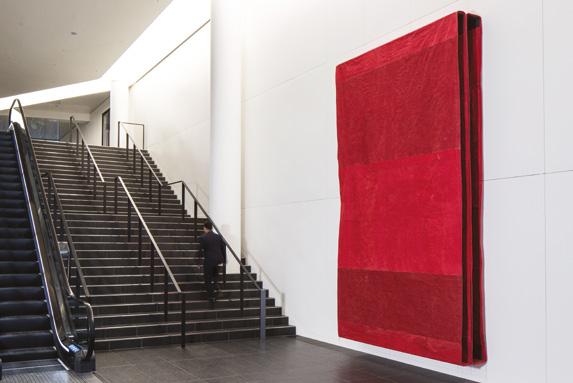
Online Award commissioned a new work from Goldsmith’s graduate Matilda Skelton Mace and our schools programme in partnership with Place2Be delivered projects in East End London primary and secondary schools. For the Pictet collection in London a new text-based commission by renowned artist Fiona Banner was developed as part of their corporate communications strategy – an innovative approach to building the collection.
We are exploring new avenues for contemporary public art – working with internationally renowned artists to deliver major new works for our cities. Commemoration is a strong theme in the UK currently, and we are helping clients explore the meaning and relevance of the twenty-first-century memorial in exciting ways. Southwark Council have commissioned Kenny Hunter to create a memorial reflecting broadly on conflict and resolution for Lendlease’s new public plaza in Walworth Square. Michael Landy has been commissioned to develop the world’s first memorial to Humanitarian Aid Work – a project initiated by Aid Workers and supporters themselves and destined for a prominent Southbank location. We are also curating an exceptional public artwork in Liverpool dedicated to Nelson Mandela’s life and work. The site, an island in the Joseph Paxton designed Prince’s Park, provides an extraordinary opportunity for an artist to rethink the use and appreciation of the landscape.
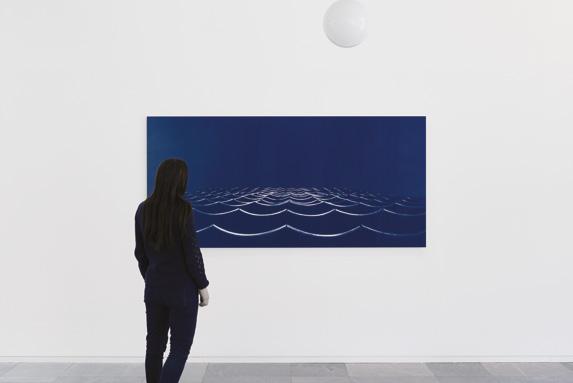
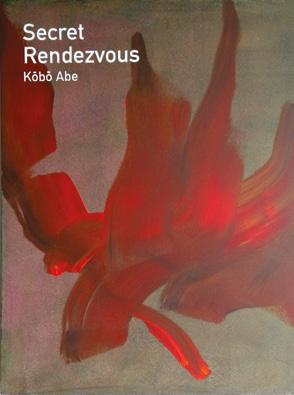

Our ongoing work with the University of Cambridge’s North West Cambridge Development embodies our approach to considering art and culture at the heart of urban regeneration. The Habitation residency programme continues, with Melanie Manchot engaging with the postdoctoral community to explore its future in the context of a new urban development. Last year’s residency outcomes included Ruth Ewan’s Another Time – a time-telling meadow inspired by Carl Linnaeus – and artists Joshua Portway and Lise Autogena’s robot drawing machine that expands their investigation into the structure of cities using models of plant growth. The installation of Wolfgang Winter and Berthold Hörbelt’s Fata Morgana Teahouse was a highlight, comprising a sculptural pavilion and pixelated wall that form the first of a number of artwork moments for the natural landscape. Ruth Proctor’s integrated artwork We Are All Under the Same Sky in the University of Cambridge’s Primary School was officially launched in June and has been welcomed as an essential element of the school’s identity and curricular focus. The ArtScapers education programme that runs alongside the public art programme is achieving considerable recognition and acclaim – helping younger generations think creatively about the changes going on in their city.
With a focus on expanding the profile and reach of the Consultancy business for 2016, we see this hugely successful year close with a strong contribution to the charitable aims, a solid business plan for growth in place, and an increasing recognition from our clients old and new of the importance of great art for great places.
Collections Fund
Nicola Blake
Hugo Brown
Theo Danjuma
Helen Janecek
Béatrice Lupton (co-chair)
Ken Rowe
Paul Smith
Cathy Wills (co-chair)
Anna Yang (co-chair)
Jill Hackel
Gold Patrons
Michael & Philippa Bradley
Bertrand Coste
Sophie Diedrichs
Emma Goltz
Rishi Khosla
Keith Morris & Catherine Mason
Bianca Roden
Ken Rowe
Dame Theresa Sackler
Pamela Stanger
Mercedes Vilardell
Edwin & Dina Wulfsohn
Anna Yang & Joseph Schull
Jill Hackel & Andrzej
Zarzycki
Silver Patrons
Corrado Abbattista
Lindy Ackrim
Renée Aguiar-Lucander
Masha Almazova
Elizabeth Bauza
Nicola Blake
Jacques Boissonnas & Bernadette de Malherbe
Hugo Brown
Mariana Clayton
Alexandre Cordovil Araújo
Howard & Veronika
Covington
Loraine Da Costa
Valentina Drouin
Sarah Elson
Tania Freeman
Domingo & Jenny Garcia
Helen Janecek
Chris Jermyn
Linda Keyte
Chris Kneale
Anna Lapshina
Paula Lent
The Lady Lupton
Mauro Mattei
Suling Mead
Flavia Nespatti
Simon & Midge Palley
Veronique Parke
Jill Platt
Ekaterina Reitman
Marina Roncarolo
Susan Rosenberg
Charu Sarma
Françoise Sarre
Dasha Shenkman OBE
Marcela Sheridan
Brian Smith
Paul Smith
Emily Sun
Salavat Timiryasov & Margo Trushina
Audrey Wallrock
Cathy Wills
Bronze Patrons
Marie Elena Angulo & Henry Zarb
Rose Barclay
Debra Blair
Diego Correa Buitrago
Paul & Gisele Caseiras
Wolf & Carol Cesman
Donall Curtin
Robert Enserro & Vanessa Colomar
Alex Haidas
Terry Heller
Audrey Klein
Zach & Julia Leonard
Will Ramsay
Karsten Schubert
Ellen & Dan Shapiro
Monika Tarr
Susie Tinsley
Diane Abela
Edward Ball
Sofia Bocca
Carolina Dutruit
Tom Epps
Maria Galea
Isabela Galvão
Abigail Heller
Christian Karam
Daria Kirsanova
Benjamin Lamb
Fabiana Marenghi
Vaselli Bond
Alexandrina Markvo
Claudia Paetzold
Maria Varnava
Lara Wolfe
Freda Yang
Svetlana Zakharova
Tiqui Atencio
Nicholas Berwin
Brian Boylan
Eric & Jean Cass
The Marquess and Marchioness of Cholmondeley
Frank Cohen
Daniela Colaiacovo
Forbes & Bridget Elworthy
Denise Esfandi
Livia & Colin Firth
Antje & Andrew Géczy
Alyne Hansen-Damm
James Hughes-Hallett
Marie-Rose Kahane
Costas Kaplanis
Michael King
Fatima & Eskandar Maleki
Elizabeth Meyer
Alison Myners
Valeria Napoleone
Tatiana Peganova
Mark Stephens CBE
Dr Richard Sykes & Penny Mason
Jackson Tang
Simon Turner
Nicky Wilson
Anita Zabludowicz OBE
Nicola Blake
Sarah Elson
Emma Goltz, Chair
Béatrice Lupton
Edwin Wulfsohn
Anna Yang

Abbot Hall Art Gallery, Kendal
Amgueddfa Cymru –National Museum Wales
Aberdeen Art Gallery & Museums
Ashmolean Museum of Art and Archaeology, University of Oxford
Atkinson Gallery, Southport
Birmingham Museum and Art Gallery
Brighton Museum & Art Gallery
Bristol Museum & Art Gallery
The British Museum, London
Bury Art Museum
Cartwright Hall Art Gallery, Bradford
The Collection and Usher Gallery, Lincoln
Ferens Art Gallery, Hull
Gallery Oldham
Glynn Vivian Art Gallery, Swansea Gallery of Modern Art (GoMA), Glasgow Museums
Government Art Collection, London
Graves Gallery: Museums Sheffield
Grundy Art Gallery, Blackpool
Guildhall Art Gallery, London
Harris Museum & Art Gallery, Preston
Hatton Gallery, Newcastle University
The Hepworth Wakefield
Herbert Art Gallery & Museum, Coventry
Huddersfield Art Gallery
The Hunterian, University of Glasgow
Imperial War Museum, London
Laing Art Gallery, Newcastle-upon-Tyne
Leamington Spa Art Gallery & Museum
Leeds Art Gallery
Manchester Art Gallery
Mead Gallery, University of Warwick Art Collection
The McManus: Dundee’s Art Gallery & Museum
Mercer Art Gallery, Harrogate
Middlesbrough Institute of Modern Art (mima)
Museum of London
National Maritime Museum, London
The New Art Gallery Walsall
New Walk Museum and Art Gallery, Leicester
Norwich Castle Museum & Art Gallery
Nottingham Castle Museum & Art Gallery
Pallant House Gallery, Chichester
Peter Scott Gallery, Lancaster
The Pier Arts Centre, Stromness
Plymouth City Museum and Art Gallery
The Potteries Museum & Art Gallery, Stoke-on-Trent
Reading Museum
Royal Albert Memorial
Museum & Art Gallery, Exeter
Rugby Art Gallery & Museum
Scottish National Gallery of Modern Art, Edinburgh
The Shipley Art Gallery, Gateshead
South London Gallery
Southampton City Art Gallery
The Stanley & Audrey
Burton Gallery, University of Leeds
Sunderland Museum & Winter Gardens
Swindon Museum and Art Gallery
Tate
Touchstones Rochdale
Towner, Eastbourne
Tullie House Museum and Art Gallery, Carlisle
UH Galleries, University of Hertfordshire, Hatfield
Ulster Museum, National Museums Northern Ireland, Belfast
University of Salford Art Collection
Victoria Gallery & Museum, University of Liverpool
Walker Art Gallery, National Museums Liverpool
The Whitworth, The University of Manchester
Williamson Art Gallery & Museum, Birkenhead
Wolverhampton Art Gallery
Worcester City Art Gallery & Museum
York Art Gallery
Aspen
Better Bankside
City of London
Chelsea and Westminster Hospital
DCMS
Grosvenor Steering Committee for Humanitarian Aid Workers
Liverpool Council / Mandela 8
London School of Economics and Political Science
Macfarlanes
Pictet
Royal College of Physicians
Sevenoaks School
Southwark Council
St George Plc
Stanhope Plc
The Crown Estate
The Woodland Trust
University of Cambridge
Verdion
Christopher Jonas, CBE
Michael Bradley Dr Sabri Challah Tommaso Corvi-Mora
Simon Davenport
Sarah Elson
Emma Goltz
Béatrice Lupton
Keith Morris
Valeria Napoleone
Richard Punt
Cathy Wills
Edwin Wulfsohn
Staff
Caroline Douglas Director
Sophia Bardsley Deputy Director
Curatorial Christine Takengny Curator, Museum Acquisitions
Ilaria Puri Purini Programmes Manager
Ali MacGilp Programmes Manager (maternity cover)
Franka Blok Curatorial Trainee
Elea Himmelsbach Collections Researcher
Development & External Relations
Dida Tait Head of Development & External Relations
Miriam Metliss Patrons & VIP Relations Manager
Jacoba Bruneel Assistant Manager, Development
Marcus Crofton Communications Manager
Art Consultancy
Fabienne Nicholas Head of Art Consultancy
Nina Johnson Consultancy Development Manager
Lanny Walker Art Consultancy Project Manager
Megan O’Shea Art Consultancy Project Manager
Jordan Kaplan Art Consultancy Project Manager
Sam Wilkinson Consultancy Associate – North West Cambridge Development
Ceri Hand Consultancy Associate
Vivienne Reiss Consultancy Associate
Jeni Walwin Curatorial Associate Administration Myles Burgess Administrator
Sian Hughes Office Manager
John Akomfrah Peripeteia (2012)
Kader Attia Dispossession (2013)
Glenn Brown
In the end we all succumb to the pull of the molten core (2016)
Martine Syms A Pilot For A Show About Nowhere (2015)
Lothar Götz Retreat for the Good Shepherd (2017)
Lubaina Himid
Allow Your Friends to Meet Your Enemies (2011)
Chantal Joffe
Esme and Alba in Madison Square Garden (2015); Esme in N.Y.C. (2015); Esme on the Beach (2015); Vita Roller Skating (2015)
Jack Knox
Assemble Granby Workshop, First Collection: Products and Process (2015)
Neil Brownsword Waster (2011)
Ann van Hoey Ferrari Red Vessel (2014)
Nel Linssen Paper Necklace (2015)
James Rigler Black Feet (2015)
Babi Badalov
I am IdealEast/Refugee Crysis/Kennedy (2015)
Thomson & Craighead Horizon (2009)
Kate Davis
Eight Blocks or a Field (Bone Doll I) (2013); Eight Blocks or a Field (Bone Doll II) (2013); Eight Blocks or a Field (Bean Doll) (2013); Eight Blocks or a Field (Bundle of Rags) (2013)
Chloe Dewe Mathews
Private James Crozier, 07:05 / 27.2.1916, Le
Domaine des Cordeliers, Mailly-Maillet, Picardie (2014); Soldaat Jean Raes, Soldaat Alphonse
Verdickt, Time unknown / 21.9.1914, Walem, Mechelen, Antwerpen (2014); Soldat Léonard
Leymarie, 16:30 / 12.12.1914, Fontenoy, Aisne, Picardie (2014)
Cat and Tree (at the Begijnhof Garden) (ca. 1973); Impasse (1970); Trellis (1973)
Mark Leckey
Dream English Kid, 1964–1999 AD (2015)
Hilary Lloyd Balfour (2015): Movie (2015); Curtain of Circles (2015); Stream of Circles (2015)
Guy Moreton KS01, The Orchard, Langdale 2012 (2012); KS02, The Wilderness, Langdale, 2012 (2012)
Ryan Mosley
An Oracle’s Vision (2016); Oracle (2015)
John Stezaker Painting (2013-2016)
Edmund de Waal oir-thir (2016)
Jessica Warboys
Sea Painting, Birling Gap, 2017 (2017)
Emilie Taylor Fields of Gold (2016)
Louisa Taylor Sophie Tea Set (2016)
Conor Wilson Garden (2010)
Ryan Mosley
Distant Ancestor VII (2011-2012); Distant Ancestor XIII (2011-2012)
Alison Wilding Arena (2000)
Special projects
p.15 © Glenn Brown, Courtesy Gagosian
p.16/17 © Smoking Dogs Films, Courtesy Lisson Gallery
p.18/19 Courtesy the artist and Lehmann Maupin, New York / Hong Kong
p.22/23 Courtesy of the artist and Bridget Donahue Gallery
Fine Art
p.27 © the artist, Courtesy The Artist and The Approach, London
p.29 Image courtesy of the artists, Photo by Static Image
p.31 Courtesy Domo Baal; Photograph by Andy Keate
p.33 Courtesy Margaret Knox
p.34/35 Courtesy the artist and Hollybush Gardens
p.37 © Chloe Dewe Mathews
2014
p.38/39 Installation view Hilary Lloyd at Sadie Coles HQ, Balfour
Mews, London 2 June – 4 July 2015
© Hilary Lloyd, Courtesy Sadie Coles HQ, London; Photography by Marcus J Leith
p.41 ® Nicolas Brasseur
p.43 Chantal Joffe, Courtesy the artist and Victoria Miro Gallery, London © Chantal Joffe
p.45 Image courtesy of the New Art Centre, Roche Court sculpture park
p.47 © the artist, Courtesy Alison Jacques Gallery, London
p.49 Courtesy the artist
p.51 Courtesy the artist and Cabinet, London
p.53 Courtesy the artist
p.55 Courtesy the artist
Omega Fund
p.59 & 61 Courtesy Aberdeen Art Gallery & Museums Collections
p.63 Image © Philip Sayer, Courtesy of Marsden Woo Gallery, London
p.65 Photography by Simon Punter
p.67 Courtesy of the artist
p.69 Courtesy Assemble + Granby Workshop
p.71 © the artist, Courtesy New Art Centre, Roche Court sculpture park
p.73 Image courtesy Jerry Lampson
Gifts and Bequests
p.77 Image courtesy of the artist
p.78/79 © Alison Wilding, 2017. All rights reserved. Courtesy of Art House Foundation and Karsten Schubert, London. Photo by FXP, London.
Consultancy
p.83 Courtesy Marc Wilmot
p.84 Courtesy Marc Wilmot
p.85 Image courtesy Anna Arca
p.86 (top) Courtesy the artist
p.86 (bottom) Courtesy the artist
‘It is increasingly difficult to acquire work for our collection and our work with the Contemporary Art Society is critical in allowing us to continue working with and collecting the best of Contemporary Artists working in Britain.’
Ashley Gallant, Collections Access Officer, The Collection and Usher Gallery, Lincoln